#especially because you can expand on things that start early in their lives. discuss problems that were always here. see the worst possible
Explore tagged Tumblr posts
Text
ngl i think raph is an underrated character to poke at for villain aus especially if he's completely alone in it, and i think his devotion to heroism and duty conceptually leaves a lot of open room for it. because like.... raph (at least in the show) has an almost childish view of heroism. the depth of his morals and principles are never really explored, outside of things like stealing = wrong (nuanced, but generally not true) and hurting people being bad.
i also think he wouldn't hurt or kill people unless he truly, genuinely believed that they deserved it, and there was no other option. but also... every bad person has their own internalized logic, and raph is genuinely very stubborn. sometimes he gets an idea in his head that's hard to shake, and he can get indignant and defensive when he's questioned. him and leo argue so much because both of them openly struggle to admit fault.... do you see where i'm going here
i love villains who openly embrace being the bad guy but god damn do i also love horrible evil people who genuinely 100% believe that they are in the right and that they're the good guy here. and the potential tragedy with his role as their protector and the eldest .... there's so much potential in him
#personal#rottmnt#this isn't a critique of raph btw i like writing him as genuine and kind flaws included#but i think the APPEAL of villain aus is deconstructing their flaws. looking at the worst possible conclusion of these parts of themselves#unless they're silly jokey ones which i love too btw#especially because you can expand on things that start early in their lives. discuss problems that were always here. see the worst possible#-route that they could go down. and i think raph is a *really* interesting character to do that with#especially with his COMMITMENT to being the good guy#what if he was still committed to being the good guy. what if he 100% believed it. what if he kept the aesthetic of heroism up the whole-#-time. but he was. the bad guy ......
42 notes
·
View notes
Text
Hi. I've started writing a semi-weekly TB Newsletter, if you're interested in that kind of thing. Here's the second letter--about public-private partnerships, leprosy, and my forthcoming big announcement about expanding access to tuberculosis care. You'll hear more about that on Thursday. Anyway, here's the newsletter. You can sign up here.
---
In advance of the Big Announcement this Thursday, I made a vlogbrothers video today on how we end TB–with the comprehensive care plan often known as S-T-P, which is short for “Search, Treat, and Prevent.” But one thing I didn’t discuss in that video is the downstream benefits of comprehensive TB care.
Once you’ve hired community health workers to screen for TB, it becomes much easier to screen for other illnesses like diabetes, high blood pressure, and non-TB lung issues (especially lung cancer). TB is notoriously a disease of vicious cycles–a disease of malnutrition that makes malnutrition worse, a disease of poverty that makes poverty worse, and so on–but addressing TB can be a story of virtuous cycles: TB survivors become TB advocates, as I’ve seen with my friend Henry in Sierra Leone. More effective TB treatment leads to less stigmatization of the disease, as communities come to see the disease as curable and survivable rather than terrifying and deadly. And better access to TB care leads to a stronger overall healthcare system, because more community health workers are better connected to more primary healthcare clinics, which allows communities to better address all kinds of health problems.
—
Mycobacterium tuberculosis is not the only bacteria of its family that causes a lot of human suffering; there is a closely related species called mycobacterium leprae that causes the disease known as Hansen's Disease, or more commonly leprosy. There are still around 200,000 cases of leprosy diagnosed each year around the world, and while the disease is curable, it also remains–especially if not caught and treated early–a significant driver of suffering and disability in our world.
There are many connections between TB and leprosy: Not only are the bacteria that cause these illnesses very similar, but patients have often expressed similarities in experience. TB patients who were encouraged or forced to live in sanitariums often compared themselves to lepers. One disheartening parallel between the diseases is that in both cases, those living with these illnesses are often abandoned by their families and must make new social connections within the new community of “leper” or “consumptive.” Also, both Hansen’s Disease and TB continue to exist largely because of systemic failures rather than due to a lack of knowledge or technology.
—
I really recommend Dr. Salmaan Keshavjee’s TED talk about how we ended TB in the U.S., and how we can end it using the same strategy around the world.
—
Last link from me today: I’ve been thinking a lot about the complex intersection between public and private investment (for reasons that will be clear on Thursday!) and I keep coming back to one infographic in an excellent paper (https://journals.plos.org/plosone/article?id=10.1371/journal.pone.0256883) about the public money that was poured into the creation of the GeneXpert Machine, which can quickly and accurately test for TB. The GeneXpert machine has created a lot of profit for Danaher’s shareholders, and it has also created some societal benefit, but it could create a lot more societal benefit if it created less profit for Danaher’s shareholders. This tension seems to me one of the defining features of 21st century life. Anyway, here is the infographic:
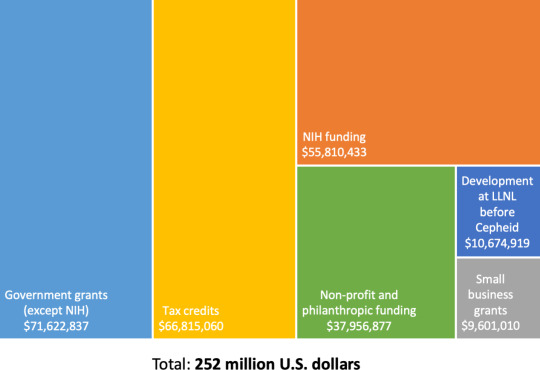
That’s the money–over $250,000,000 of it–that came from taxpayers (mostly in the U.S. and Europe) to fund the creation of the GeneXpert Machine. And yet, this tech largely funded by the public is controlled entirely by private enterprise. I’m troubled by that model of value allocation, even if I still believe that private money and private enterprise have important roles to play in fueling innovation. But taking a quarter billion dollars of public money and then claiming total ownership over a technology, and using that ownership to deny the technology to the world’s poorest people, seems like a deeply flawed system of resource distribution to me.
I’ll see you on Thursday. I’m nervous and excited.
DFTBA,
John
#tuberculosis#it's so funny how this became my job#not like my paying job but the one i do and think about all the time#like of all things#it was this#this is my hobby#anyway#beats jkr's horrible fucking hobby anyday
860 notes
·
View notes
Note
I kinda felt disappointed and kinda disheartening in the discussion surrounded taash being non-binary and people just framing their gender identity discussion as just baby first queer meetup it just I've been out for several years as non-binary and I still don't have access to these kind of outlets I don't know but I guess people forget that everyone journey is different.
and also like it does make sense for taash experience to be like that since its literally their first time exploring new gender identities?
Hey anon! I think that's exactly it - this isn't at all limited to people talking about Taash or the Veilguard fandom (or people who played and didn't like it) but on some level Taash actually seems to me to exactly play out the (explicitly canon scenario) of "what if you felt like something was weird or off about how you experience yourself but didn't know what and it had been going on so long that you'd internalized it and thought it was normal for everyone and this also got caught up with your complicated relationship with your mother and you blew up at your coworker for walking around in a kinda low cut shirt on her own personal time and instead of being like WELL FUCK YOU TOO she was like 'interesting. why are you doing this because I don't think I'm the problem.' " Like, I was on a lot of feminist websites aimed at young women in the early 2000s as a teen and so lesbianism and bisexuality were both talked about a lot but no one was like, bringing up Kate Bornstein and Leslie Feinberg and actual THEORY until college. Like, truly, until maybe 15 years ago, when social media with an anonymous angle started blowing up? You had your gender and sexuality discovery through doing and living and talking to other queer people irl or by finding a library or bookstore that had what you needed, if you even knew what you needed beyond "I'm weird and feel wrong." You had to go to a group. You can literally read Alison Bechdel's account of doing this for lesbianism in the 80s. Taash is actually just acting like someone who can't privately learn all of this from a carrd and has to actually talk to people and take notes. And as for the actual term...you know how people always mock historians for being like "these two people were close friends" and they're like OH MY GOD THEY WERE FRIENDS WHO WANTED TO BE BURIED TOGETHER? Well, have you considered Taash is referred to as nonbinary and has the whole pronouns discussion because if you go with more euphemistic language, again, someone will be like "no this is just representative of gender nonconformity" and call Taash a tomboy.
I don't want to derail the above but I do feel a lot of people online, especially who have been on social media from a very young age, just...struggle to comprehend the following three things to a degree I find worrying.
perspectives, opinions, and experiences that are different than yours are good things to experience regularly; you should expand your mind and comfort zone
representation does not mean "people who had the same exact experience with the same exact outcomes as you for the same exact gender/sexuality/race/ethnicity/gender" and is just as much to show people not of those demographics the inner life of characters who are
You do not need to like a character as a person to find them interesting or well-written/acted.
and i feel a lot of weirdness towards Taash coming from people who are nb or queer themselves lands in those categories.
25 notes
·
View notes
Text
How San Diego’s Climate Impacts Your Home’s Drains—and What to Do About It
Living in San Diego means enjoying year-round sunshine, mild winters, and beautiful coastal views. But while the weather is a major perk of life here, it’s not always friendly to your home’s plumbing system. Many homeowners are surprised to learn that even San Diego’s seemingly perfect climate can cause issues beneath the surface, especially when it comes to their drains.
If you've been searching for reliable drain cleaning in San Diego, understanding how local weather conditions affect plumbing problems can help you stay ahead of costly repairs and clogs. Let’s explore how San Diego’s climate affects your drains—and what you can do to keep things flowing smoothly.

☀️ The Dry Season: A Hidden Drainage Challenge
San Diego is known for its long dry spells. While the lack of rain is great for outdoor plans, it’s not so great for your home’s drainage system. During dry periods, tree roots instinctively seek out sources of moisture, including the condensation and small leaks within underground pipes. These roots can grow into the cracks in your sewer lines and drains, eventually causing serious blockages.
Even if your drains seem fine on the surface, root intrusion can lead to slow drainage, backups, or even burst pipes over time. Many San Diego drain services report an increase in calls for root-related clogs during the drier months, which is why this is the case.
🌧️ Flash Storms and Sudden Rainfall
On the flip side, San Diego occasionally experiences sudden downpours, especially during late summer or early fall. Because the ground is often dry and compacted from long stretches without rain, these storms can cause flooding and surface runoff that overwhelms your home’s drainage system.
If your outdoor drains, gutters, or storm systems aren't properly maintained, that excess water can back up into your home, causing not only inconvenience but also property damage and mold growth. This is one of the most common weather-related plumbing issues that homeowners in the region face.
🌡️ Temperature Fluctuations and Pipe Stress
While San Diego doesn’t experience the harsh winters seen in other parts of the country, the mild temperature shifts between day and night can still affect your pipes. As temperatures rise and fall, pipes—especially older or poorly insulated ones—expand and contract. Over time, this can create small cracks or loosen joints, allowing debris and grease to build up and clog the line.
If you notice recurring slow drains or strange odors, it could be a sign that your pipes are under stress from these changes and may require inspection or cleaning.
🏡 Everyday Living + Local Climate = Drain Trouble
Beyond weather extremes, the lifestyle and architecture common in San Diego homes can also play a role. Many older homes in the area were built decades ago and still have aging pipes that are more prone to clogs, leaks, and breaks. Add in everyday debris like food scraps, hair, soap scum, and grease—and you've got a recipe for drainage problems.
Combine that with the environmental factors we’ve discussed, and it becomes clear that regular maintenance is crucial.
✅ What You Can Do to Protect Your Drains
Now that we know how San Diego’s climate can impact your plumbing, let’s talk about prevention. Here are a few smart ways to keep your drains in top shape year-round:
1. Schedule Annual Drain Inspections
A yearly check-up can catch small issues, like root intrusion or slow drains, before they become expensive emergencies.
2. Use Drain Screens and Be Mindful of What You Flush
Prevention starts inside your home. Avoid flushing wipes, pouring grease down the sink, or letting food waste pile up in the garbage disposal.
3. Maintain Outdoor Drains and Gutters
Keep your outdoor drainage clear of leaves, dirt, and debris to prevent backups during those rare but powerful San Diego rainstorms.
4. Invest in Professional Cleaning
If your drains are slow, smelly, or backing up, don’t wait. Searching for professional drain cleaning near me can lead you to local experts who can perform hydro jetting, root removal, and camera inspections with minimal disruption.
5. Know the Warning Signs
Slow drainage, foul smells, bubbling in toilets, and gurgling sounds are all signs that it’s time to call in a professional.
🧰 Don’t Wait Until It’s an Emergency
Proactive maintenance is the best defense against the effects of San Diego’s unique weather. Whether it’s persistent dryness or unexpected rainfall, your drains bear the brunt of it all. Fortunately, most plumbing issues caused by the climate can be prevented with regular cleaning and timely intervention.
If you're starting to notice signs of trouble or just want peace of mind, professional help is just a call away.
For expert solutions tailored to San Diego homes, contact us today and let our experienced team keep your drains clear, your plumbing stress-free, and your home protected from weather-related damage.
View Source: https://ez-plumbing-usa.medium.com/how-san-diegos-climate-impacts-your-home-s-drains-and-what-to-do-about-it-6600d605b366
0 notes
Text
Hi! Ace person (not demi, but under the same umbrella and also starved for representation) and Lucanis fan here!
OP summarized really well how annoying it feels to have the writer go "yeah this was totally intentional the whole time, the company just didn't advertise it the way they did all the other rep." The company made such a production about all the companions being romance-able by any PC configuration and then said it was because they were all pansexual, 'because representation' not because they were making the companions 'player-sexual', but then the company outright denied having ace rep. I could put that down to corporate PR teams not understanding that asexuality is a spectrum that demisexuality falls into. If I was inclined to give them the benefit of the doubt, I might even be persuaded that Mary Kirby was planning to be more blatant about it, but the scenes/dialogue were cut. But I'm not inclined to give the benefit of the doubt (especially given that some of those cut-scenes were apparently 'steamy'). It feels a lot like claiming credit after the fact for brownie points.
As an ace person, I'd like to expand a bit on what OP said about Lucanis being traumatized. To preface, I like that Lucanis is said to be demisexual. I'm so damn starved for ace rep. And I appreciate that the ace rep here is a man in his thirties who doesn't go through an arc 'figuring it out' or stressing about how he experiences romance/attraction. (So much of existing ace rep involves angst about it. I feel no angst about my orientation, only vague irritation that it takes a power point presentation to explain. Seeing people angst about it does not inspire an 'oh that's me' response, it makes me feel sad for them.) He just is the way he is, and lives his life. Dude has bigger problems than swapping bodily fluids with people. I also like that he's inexperienced and doesn't angst about that either.
But they made the ace (demi, if you prefer the distinction) character a deeply traumatized person whose hesitance to be intimate can be attributed to his trauma. The PC gets a whole personal quest for Lucanis dealing with his tendency to internalize his reactions to everything but especially the trauma. Then the final romantic cut-scene implies intimacy without commentary regarding hesitance of any kind. As if the early instinct to pull back was overcome with the trauma. I'm really damn sick of ace-coded characters being traumatized. My sexuality was not formed by trauma. There is a misconception that people aren't actually ace, they're just traumatized or repressed or haven't 'met the one' yet (which, btw, sounds a lot like demisexuality doesn't it?). If trauma formed sexuality, there would be a lot less people interested in men (yes, that's generalizing, but come on, look at the statistics). I am the way I am. Can I have one ace character that doesn't angst about it or wasn't traumatized in an extremely violating fashion?
Also, Lucanis doesn't discuss his lack of intimate experience with the PC. It's tucked away in companion banter with Emmerich. If the PC doesn't bring the two of them along enough, you could easily miss it. Again, Lucanis is a character that has a lot more going on than dating troubles, but if the PC romances him, it would just be reasonable character writing to have a scene about 'oh yeah, this dating thing, never really done that. never really done the physical intimacy bit either. but I would like to do that, with you.' The fact that there isn't a scene or discussion or dialogue like that makes me feel like the writers had more plausible deniability to say he isn't demi, than they deserve credit for adding demi rep.
I wasn't looking for him to say the words. I actually prefer it that they don't. I liked what they did with Krem and Maevaris: in my opinion, they balanced affirming how they identify with setting appropriate language and reactions they have to deal with. It breaks my immersion in the setting when characters start using modern terminology for things that sometimes even the average modern person isn't familiar with. But one, one singular line where Lucanis says that before the PC, he's never truly thought about someone 'this way' would have done a lot of heavy lifting.
You know who would have been revolutionary as ace/demi rep? Davrin. The nice, handsome, sociable, heroic, knight in shining armor, ready to martyr himself to save the world, trying to raise a griffon, no intimacy related trauma to be found. Romancing him has been described as straightforward but intimate. Which is great, he's a lovely character, I'm very fond of him. But if he was ace/demi? On the far side of the map from every stereotype people think of? I would have lost my mind. Again, I really like Lucanis as a character, but if I have to seek out fanfic to fill in the gaps, the writers didn't accomplish what they said they were aiming for.
I openly accept any corrections, especially from actual Lucanis fans or demisexuals. If you disagree with anything I say this point onwards, please tell me!
The way Lucanis went from "bisexual disaster " to "panromantic demisexual" after the game came out feels weird (Both are direct quotes about Lucanis from Mary Kirby). Before I get into this I'd like to clarify, neither is a problem, Lucanis being demisexual in a vacuum is not what I take issue with.
But it feels like another excuse. Being demisexual means something it's not just another word for inexperienced or hesitant. If Lucanis is demisexual why does he fall for Neve or Rook nearly just as fast as any other companion does and why does he never acknowledge that?
There are many hints that he's never dated before (not sure if it's ever outrught stated), and again, he is shown to be hesitant... but nothing uniquely in the direction of demisexuality.
This game clearly isn't afraid of using real terms (it has an entire codex going over different non-binary labels), so why is this where they draw the line? Why does Lucanis never acknowledge the fact that he requires a deep connection before he feels certain things?
I've seen people call Krem from DA:I bad trans representation because he's never called transgender, which I respectfully disagree with. Still, Krem is explicitly trans and then Lucanis's demisexual coding is just... pulling away before you can kiss? It doesn't help that the scene happens after something that would definitely explain why Lucanis would need to clear his head.
That's also paired with the fact we do get told constantly that he's traumatised and he mentions having little faith in people prior to his romance (at least with Neve). This isn't to say he can't be demisexual, not at all, but there's always an explanation for his behaviour that people would think of before demisexuality and there's no effort put in to otherwise lead us to it.
For a game that is on the nose about everything, I find it hard to give them the benefit of the doubt that this was the one thing they handled with subtlety.
Best case scenario, Mark Kirby was just trying to... I don't know, set up expectations to defy them? Worst case scenario, this is just another case of someone from Bioware lying to us about this damn game.
#lucanis dellamorte#bioware critical#veilguard critical#rant post#this probably won't be my last negative post about veilguard#<- stealing ops tags#asexual#demisexual#ace rep in media#dav spoilers
35 notes
·
View notes
Text
Post Grondor Field AM Analysis
I'm prefacing this by saying that I'm still not sure I can write a good analysis of this scene for two reasons:
1. I don't know what comes after, and
2. I'm very emotionally involved in what happened.
But I tried my best. One thing is for sure though, what happened in Grondor in AM was an incredibly significant turning point for AM and Dimitri and my thoughts and analysis on it will definitely expand as I keep writing about and playing the game.
Part of me is just so happy I got to see Dimitri's supports, have the inevitable turn around, and get to do things like tea and dinner time again that it's hard to be objective about this scene.
And by "this scene," I don't mean that actual fight at Grondor, but everything from Fleche's attack to Byleth's words in the rain later.
It wasn't all about Byleth . . .
Given how poignant Dimitri's character arc has been so far, I had a deep rooted fear player-pandering would ruin it. Byleth, as a concept, isn't bad, but too often the heaps of praise feel underserved and other things (like Claude's intelligence, Edelgard's relationships with everyone else) get ignored to make more room for player-pandering.
Thankfully this did not happen. Byleth, throughout the early chapters of AM's part 2, failed to reach Dimitri. And, honestly, seeing Byleth actually struggle for once has done wonders for how I view her character. Still, I worried that player-pandering-power, rather than something that felt earned, would cause the inevitable eye-opener for Dimitri.
But it wasn't just Byleth. Fleche's vengeance kicked everything off, what veered Dimitri away from his fate in other routes. He accepted his death at her hands, not bothering to defend himself. Rodrigue stepping in the way and his parting words forced Dimitri to confront things he'd ignored. Throughout AM so far, people have posed questions to Dimitri who refused to answer them because he didn't want to face what they asked. But Rodrigue dying for him, spending his final words telling Dimitri to live for himself - combined with Fleche's attack - forced Dimitri to confront things he avoided. It wasn't until after all of that when Byleth steps in.
And Byleth didn't "fix" him either. Dimitri's supports show a young man who's still very much struggling with his mental health, poor self-image, his previous actions, and wondering if he deserves not only to live for himself - but if he even deserves to live. Byleth didn't hand-wave Dimitri's problems away.
Everything about the scene is stronger because it didn't fall back on player-pandering, but more earned, realistic, and dramatic actions and consequences - including Byleth's involvement which felt far more earned than usual because of prior failure.
But I wish Dimitri's friends played a bigger role.
Not everything was perfect though. I wish we got a little more than we did from Dimitri's house mates - especially his childhood friends Sylvain, Ingrid, and extra special mention to Felix and especially, especially Dedue.
Throughout all of AM, none of the above mentioned characters feel utilized to their full potential. This isn't a problem exclusive to AM, and by all means it's far from the biggest offender, but given how close all the ties are in AM, it's felt when it's not there.
I still don't know what exactly I would've done with them. Maybe I'd need to make the game an actual novel to do it, and you can't forget how perma-death has historically held back games at times, limiting major moments to a select few "retreat" candidates.
Still, though, getting a bit more from Ingrid, Sylvain, Felix, and Dedue would've made the scene even more powerful.
I actually really liked the scene in the rain.
I haven't made it a secret that I dislike Byleth. Or maybe disliked is more accurate. Lately I've been rethinking my stance on Byleth, in part because I've heard from people who like her or found ways to make her work and from my own thinking about the game while planning future write ups.
I don't think it's Byleth I really dislike, but the player-pandering. Separating the two isn't easy, but it's easier since I've starting coming around to seeing Byleth as her own character.
There's been a few moments that made me care for Byleth, and this scene in the rain was one of them. Because she didn't just fix everything. She tried and failed for months to reason with Dimitri, and despite everything she never gave up on him or failed to keep offering her hand.
I'm not going to lie. I got all the bubbly, heartwarming, heartbreaking feels the writers wanted me to in this scene. Seeing Byleth reach for something and fail, and then finally, finally get through was rewarding in a way many of Byleth's prior accomplishments aren't because this one felt earned. And by God did she earn it.
Some people will likely disagree with that last point, but I disagree with them. She asked Dimitri hard-hitting questions, forcing him to come to unpleasant conclusions rather than trying to force him into anything. She kept Dimitri from veering to far off course, even at expense to herself when she killed Randolph. She saved Dimitri from Fleche when he refused to save himself. She quietly supported him, coaxing out the good she knew was still there and refused to give up on.
I'd never in a million years say someone in real life should put up with Dimitri's toxic behavior and verbal abuse, even considering his extreme trauma and aggravated mental illness. But seeing someone fuck up so badly still get forgiven, still get supported, still struggle but honestly change for the good, still get loved, start to accept and forgive himself through the power of love and forgiveness from others is very powerful, especially since media so often downplays those "softer" things as weakness in comparison to the "badassery" of ambition and stoicism. Using Byleth, who previously had little experience with feelings, who was encouraged to experience them in healthy ways by Dimitri, return the favor isn't really the worst choice.
It's cliche, but cliches aren't always bad.
The mentor dies. Redemption in the rain. Revenge against the protagonist's actions opens their eyes. Etc . . . This scene was chuck full of cliches, but that's not necessarily a bad thing.
Tropes serve an important narrative purpose because a writer can rely on them to convey a message to the audience that either saves time or sets them up for something unexpected or even expected. Fire Emblem has always and will always be incredibly cliche and full of tropes. It loves tropes so much there's in-universe ones that make some unit or character discussions sound like a foreign language to people outside of or new to the fandom, talking about "Ests" and calling someone a "Camus."
What matters is if a story pulled something off well, not if it's terribly unique. A mentor dying is powerful because it forces the student to grow. Redemption in the rain is high symbolic of water washing things away + the somber atmosphere rain creates. Someone trying to get revenge against a character provides an eye-opening experience about the ripple effect of their actions. We see these things in fiction all the time because they work.
All the tropes worked like expected in this scene. Using images instead of cut scenes did make less of an impact, but more on that later.
Tl;dr: There's nothing unexpected or terribly unique about what happened. It was honestly painfully predictable, but that doesn't make it bad and is in a series that does this all of the time.
The voice acting carried because those images can't.
A major downside to this scene is that it used vague images instead of a cut scene. I get that budget and time were likely concerns, but many cut scenes from earlier in the game seem rather trivial. Did we really need that dance one? Really? I don't think so.
This was a hugely important, action heavy moment. Using one or two still images to convey everything that's happening and all those emotions, really makes it less than it could've been.
That said, the voice acting saves it. I've raved about how amazing Chris Hackeny is as Dimitri, so nothing new here. Rodrigue's and Fleche's VAs also did a fantastic job. No one oversold or undersold the emotions. Even without the cut scene, you felt what happened thanks to the skill of the actors. This scene would've been so much harder to engage with without them, if this was an older FE game where all you got was text. This is 100% one of the moments highly elevated by the decision to have a fully voiced game and choosing high caliber talent (let's not talk about Radiant Dawn's voice acting).
Questionable support timing.
One issue I had came right after the scene when I viewed Dimitri's supports. The nature of some - like his with Raphael and Alois - didn't quite line up with the character I saw in dialogue right after. I wish they staggered them a bit more or got picker about what you could get in part 1 or 2.
This isn't limited to Dimitri either. In the same support batch, I also got a Marianne B support where she still had no confidence or self-worth. And then like 10 minutes later I talk to her in the monastery and she mentions about how seeing all the death in Grondor made her value her life even more.
In the past, I've also received entirely valid opinions that Dorothea in part 2 is hard to understand because she's cherry and flirty in her supports, and morose and hates the war in her monastery stuff, making her seem inconsistent.
It's a bit jarring. It's not really an issue for characters who don't change much like Edelgard or Raphael, but even for characters with more subtle differences than Dimitri, Marianne, and Dorothea - like, say, Lorenz - you get a lot of weird stuff because of supports. I just think Dimitri's stands out because he's a main character with a really prominent, important turning point for his growth.
86 notes
·
View notes
Text
Ok so in light of the Independent article (see my tag #fusebox layoffs for more info), I’ve been trying to piece together the sequence of events that lead to FB Going to Shit™.
All of the below is based on articles, tweets from the staff, and dates from screenshots. Especially with the Matchmaker stuff, I’m using the dates I personally accessed the stories- that might not be accurate to when they were actually released to an international audience, just when my phone updated the app. In hindsight, I’m not a great person to do this because I have a shit memory and don’t keep receipts, so if you have any corrections PLEASE lmk either in the dms or replies.
In sum, the timeline appears to be:
1. Key players left Fusebox in early 2020.
The one that people are probably most familiar with is David Gallopim, one of the artists who helped define the S2’s distinct style, leaving sometime before March 2020. He seemed to indicate that there was conflict over the new art style of S3, and released assets he’d designed of Harry in his own style (notably way prettier than Harry looks in-game).
But probably more important to the direction of the company, Michael Othen, one of the co-founders and former CEO, left in July of 2020 (I had thought it was earlier in the year but according to LinkedIn it was July). It’s much more unclear why he left, but it’s notable because he was a huge force in making the game inclusive of LGBTQ characters.
So all in all, not a great sign when employees who had a huge hand in creating the content and direction of a game that defined its success jump ship. Especially after the game was seemingly hitting its stride, with the host of Love Island (the TV show) doing a sponsored Let’s Play of S3 and projects in the works like Boat Party and CMM.
2. It seems like Fusebox‘s CEO/executives hired new management, either in 2020 or early 2021. Employees complain that the executives don’t understand what it takes to make a game and are pulling the studio in the wrong direction. It’s unclear if the newly hired execs had experience.
Wil Stephens, the CEO/founder, has been with FB since its inception but also appears to have only founded game distribution ventures and not worked in any development or employment capacity. If that’s the case, maybe the complaints about lack of experience/knowledge about the mechanics of making games work are about him. If not, then some of the newly hired execs would likely be to blame.
Paul Virapen, COO, was brought on in November of 2020. He’s worked with Disney’s gaming division, Big Pixel studios, Wooga. The quality of that experience is dubious since he headed up the ‘let’s make apps for Apple watches, it’ll be the next big thing’ department… Lol. Notably also, all of his roles had been in the executive/managerial realm, not the development teams, so the complains might have been about him. THIS IS SPECULATION, but I’m willing to bet that Virapen was a if not THE driving force in switching Fusebox’s focus entirely to matchmaker. All the studios he’s worked with have primarily produced and promoted Match 3 games, and he has a background working with big studios that produce games for large international audiences, not small studios making narrative games for limited audiences.
A new Manager of Finances, Ruth Erskine, was brought on in December of 2020
Rob Goddard, a new producer, was brought in January of 2021
Several key operations positions were filled by existing employees being promoted to management- 2 as far as I can tell. But as a whole it seems like December 2020 was a huge shift in leadership for the upper management while a lot of the other teams expanded but kept their old players as well.
3. At some point in late 2020- mid 2021, the executive team made the decision to switch LITG’s focus from a narrative pass-based game to a Match 3 incorporating romance narrative cut scenes. In early 2021, Fusebox teased more content to come while releasing S3 (seemingly referring to Matchmaker and not S4). In the interim between S3 endings and Boat Party’s release they put out an interview confirming the new game will be Match 3 but did seem to indicate that the plan at that time was for Matchmaker to be a side project with a different development team and not replace the main game. Notably, the LITG writers and artists were reassured that their roles will continue to exist (according to the independent article) as they’re working on S4.
3. In September of 2020, Matchmaker became briefly available in the US. That’s when I first downloaded it, at least. It would be added/removed from the google play store multiple times before having a unilateral release in July of 2021.
Throughout 2020, Matchmaker is available to Asian audiences solely with LITG S1 getting rolled out in incremental updates.
Eventually, Beanie Quinn is released (March 2021)
LA Noir is released (May 2021)
Seduction Games is released (late May or June 2021- I got the update and played it June 3rd, but hadn’t opened the app for a month or so. It might have come out before then, which is unfortunate for this timeline since it’s so inextricably linked to the open letter and layoff dates)
LITG S2 is released (only like 20 levels of it) the same month- June 19th for me. Notably, all of these stories are only released to an international audience, with the UK and USA still not having access to the app.
4. At the same time, Fusebox’s internal affairs are pretty quiet from 2020-2021, at least on social media.
S3 comes out in 2020, Boat Party comes out later in the year and finishes in 2021. Post S3 in October of 2021, a survey goes out gauging player interest in new art styles and representation, which was pretty in keeping with past actions and seemed promising for S4.
Boat Party features a promising cross promotion implementing irl brands into the game. It’s unclear if enough money was made from this on FB or the sponsor’s end to make that strategy viable, but that might’ve impacted management’s outlook for the profitability of LITG.
Fusebox teases more content for the summer on Instagram, and then follows up and confirms it’ll be a proper season.
5. More key players leave in early 2021
Ed Sibley is still listed as Narrative Direction on LinkedIn, but he’s not credited as a writer on Season 4 (he was on 3,2,and 1) and started work with NetSpeak games in May of 2021, so we can assume he left around then or at least transitioned away from Fusebox then.
Fred Francis, another writer who had been on the team since S1, turns in his resignation ‘weeks’ before the layoffs were announced in late June. So we can assume he made his exit sometime early June or late May.
6. Prior to the release of Seduction games in May/June, staff expressed concern about the biphobia in Seduction Games. No sources have given a specific time when this took place. They were reassured that the problem would be corrected prior to release, but then the story was released as is to an international audience in June. The article released by the Independent is unclear- there might have been discussion prior to the open letter where staff expressed concerns and then were reassured before the game going live. OR the open letter might have been the first expression of concern by the staff. I tend to think the former, and the open letter was a response to Matchmaker going live with Seduction Games anyways, but I have no proof for that. On May 24th, 31 employees sent an open letter of concern regarding the problematic content in Matchmaker. This letter isn’t public, so we don’t know the scope of the employees' concerns or who the employees were.
7. To resolve the situation, a meeting between the staff and at least the COO (likely more than just him though) was held sometime after May 24th. Allegedly, Virapen was disrespectful to the employees who had questions, refused to answer, and ended the meeting early before any resolution was had by closing his laptop and leaving the room. At least 4 HR complaints were made in the wake of that meeting, we do not know the nature of those complaints.
8. Some time mid-July (maybe July 26th? A writer tweeted about their job ending soon on that date), employees were made aware that the LITG app would move into ‘sunset mode’. It’s unclear what was communicated, but it seems as though S4 will be heavily delayed or cancelled altogether and no future seasons would be made. Writers begin to post about looking for work on Twitter
9. June 30th- The majority of Fusebox writing staff announce on twitter they’re out of work. In addition to the entire writing staff, unity engineers and producers are also let go.
10. July 5th - Fusebox executives respond to an article by MCVUK with a statement asserting they were “consulting with [their] employees on a proposed change to its business model” that would focus on producing Matchmaker content. They also expounded that the move was to secure “cash injections and and continued support from respected investors across the media and gaming industry”
11. July 6th- Fusebox announces that S4 will be delayed from the summer release date and that there is no fixed release date.
12. August 2nd- three jobs are posted to Fusebox’s careers page on their website, one being Head of Narrative Content. In the job listing, it specifies that they’ll be maintaining existing properties as well as new ones, and that because of the co-development model (re:fusebox outsourcing Matchmaker to another studio) the new Narrative Lead must collaborate with external content creators.
Hopefully posting this timeline gives players a better understanding of how radically Fusebox has changed in the course of 2021 (and how royally they screwed over the people who made LITG what it is). Again, please let me know if you have receipts showing dates are different or things to add.
34 notes
·
View notes
Note
The books that you posted about really intrigued me. And the books seemed really cool, I was wondering if you have any book recommendations? For any genre.
:0 Someone's asking me about book recs? This has never happened before I'm scared 😂😂 So, I suppose I should warn you that a lot of these are fantasy. Also, thank you for taking an interest 🥺🥺
This is gonna be loooooong, so continue to read more. Also, all the links are for the Goodreads pages so you could read the blurb and reviews if you're interested. Word of warning though, these are all of my opinions, so if they don't work for you--that's okay. Tastes are fickle :))
Also, if you have any book recommendations for me or want to talk about books, then please feel free to pop in my inbox because I LOVE discussing and getting excited about books.
Books that I've already read:
The School for Good and Evil series by Soman Chainani--there are six books in total (seven if you include the handbook), but this was one I read when I was around 13/14. It's kinda like a fairytale retelling, where there are two schools; one for good and the other evil. It has a lot of references to folktales and discusses the divides between good and evil, girls and boys, and young and old. It's a story about self-discovery and I just love the characters--especially their relationships and dynamics with one another. Netflix is actually making a movie about the first book and it's going to come out sometime in 2022. Hopefully they don't screw it up 😔😔
A Thousand Nights by E. K. Johnson--I know this may not be for everyone, but I love this book. There is a sequel that I haven't gotten around to reading, but this one specifically was one I enjoyed quite a bit. It's like a retelling of the folktale One Thousand and One Nights (commonly known as Arabian Nights) but with more a fantasy twist to it. It's slow-paced, but it has so much meaning behind it. It paints such a beautiful picture in your head with both the imagery but also has a subtle feminist strength to it through its deliberate choice of words and description--not to mention it has a very strong feel to the pre-Islamic Middle East setting as compared to other retellings like The Wrath and the Dawn, which is much more suited to be classed as YA than this (by no means is that derogatory to any of the books, but it's just to explain how they're so different despite being based off the same folktale). Just read it, it's honestly amazing.
The Sin Easter's Daughter series by Melinda Salisbury--Okay, funny story, I actually read the second book, The Sleeping Prince, first by accident. A problem I have with a lot series, is something commonly known as second-book syndrome--as in, I'm not particularly a fan of the second book in a trilogy series. Once I realised my mistake and read the first book, The Sin Eater's Daughter, I found that I wasn't as in love with it as I was the second, so I thought that might've been just because of the way I read it. But when I read the reviews, I realised that a lot of other people thought the same as me despite having read it in order; the second one was more loved than the first. Unfortunately, I haven't read the third book yet, but I feel like The Sleeping Prince was enough to put it on this list. Once again, this is fantasy with tones of the Pied Piper in it, and there is so much more I could say, but again it would be more about the second book than the first so I won't spoil it for ya. But just sayin', if you wanted to read the second book as a stand-alone, you can do since I myself kinda figured out what was going on and filled in the gaps by myself. This is probably because the first and second book follow different characters (and I assume it switches in the third book, but again, I haven't read it).
The Song of Achilles by Madeline Miller--now, this GODSEND of a book is one that I rate highly. It's based off the Iliad (so it's heavy on the Greek mythology), though it follows Patroclus rather than Achilles throughout the whole book. If you don't know anything about the story, then I won't spoil it--just know that I knew the story of the Iliad and was in this state of dread the entire time 'cAUSE THERE'S SO MUCH FORSHADOWING. All I can say is that I love the dynamic between the two guys and the story is so heartbreakingly beautiful. Bless 'em 😔😔 But a friend of mine found the writing a little bit confusing (she still loves it) since you kinda have to read between the lines--it isn't blunt. Also, one word of advise I'd like to give on good stories, and specifically plot twists, is that the shock factor may occur the first time you read it but what makes a good story or plot twist is the way it makes you feel--it should still be positive no matter how many times you re-read it. Shock factor isn't everything, so when I read this there was no shock factor for me (I knew what was going to happen from me previous knowledge) yet this book still kept me gripped onto it. I didn't loose interest--and that's part of the reason why I love it.
Caraval series by Stephanie Garber--I put this on the list because of the progression within the books, despite it being fast-paced. Book one follows one of the two sisters during the Caraval who is accompanied by a guy and the whole description was very magical--kinda alluding to the magic of Legend himself (the Caraval Master). In it, there is mentions of what kind of world it is, but it doesn’t really get explained until book two, which follows the other sister to find out Legend’s real identity for a certain reason that I won’t disclose ‘cause it’s a spoiler. This expands a lot more about how the present came to be as it was and also explains a little more about the background for the major characters. Although I’m in the early chapters of the third book and so can’t really comment on it, all I can say is that so far, it brings the two stories more together than they were before as it switches viewpoints between the sisters; I feel like that’s also why I don’t hate the second book in this trilogy, because the first one seems more like a prequel to set the scene while the second feels like the beginning of the actual story, and the third would be it’s conclusion. Okay, so, fair warning, there is a lot of metaphors which mix senses (for example, describing an action/emotion as a colour/image/taste) and I understand not everyone likes that writing style, which is completely okay; I just happen to like it.
Daughter of the Pirate King series by Tricia Levenseller--the main girl, I feel, is either a love-or-hate character. Personally, I don't particularly mind her, since she's just fun to read. There are parts where she tells you just how awesome she is but can't show you because she would give her act away (she's pretending to be a prisoner on a ship to steel a map) but if it was in any other scenario, I would despise that. I suppose my plus points would be for how she reacts internally to what she's doing, you see the whole process going on in her mind--and it isn't perfect, mind you, but the fact nothing is perfect makes it better. Though I could see why people would think she was annoying or the romance was very fast-paced (I prefer a slow-burn, but I don't mind this either). One thing I will say is that there are two characters (one in particular) that I love the dynamics of. Also, there's pirates. I don't think I need to explain further on that point.
Books I'm in the middle of reading that seem pretty cool so far:
The Cruel Prince by Holly Black--I'm halfway through this book and so far I'm really enjoying it. The dynamic between the main girl and her nemesis is just unlike many enemies-to-lovers I've ever read (including online) because they just hate each other so much. Like, she's not gonna be seduced by him and get into a really toxic relationship where her feelings are being taken advantage of. She's grown into being smart, she's grown into being skilled, she's not a love-struck idiot that makes impulsive, nonsensical choices. There are two more books after this and apparently it gets better and the main characters find some ground to not be toxic (again, not sure since I haven't read it myself). Now, this is probably going to get me a lot of hate, but I'm not a fan of a certain popular YA author who has a very popular book series that involves fae. I find this a much more likeable alternative since the faerie are not humans with superpowers and pointy ears. There is actual description, actual difference between the humans and the fae, different rules they live by, two examples being that humans can't eat fae food otherwise [redacted] and the other being the fae are immortal (the kind that doesn't age, but can be killed). There's consistency in the world building and the characters are not too overpowered--and this itself just set above all the other faerie books I've read thus far.
Lost Boy by Christina Henry--this is a Peter Pan retelling that I'm still in the first half of the book. Not got much to say except for the characters are even at such a point are distinct with each other (I can already tell that Peter Pan is a Psychotic Asshole™). It's very impactful, but be warned, it's dark and violent too. I mean, when I say Peter Pan is a Psychotic Asshole™, I mean it with every fibre of my being. And it is a very good origin story to Captain Hook, who you begin to empathise with quite a bit even early on within the book. I also like a few other books from the same author since she delves quite a bit into dark fantasy and story-retellings which I personally adore, but I feel like this one is a good starting point. Either this, or The Girl in Red which is Red Riding Hood is bi and goes on a murder-spree.
The Archived by V. E. Schwab--I've actually got a couple of this author's books but I decided to put this one on because so far I'm enjoying it so far. The atmosphere of the story is very eerie and it gives beginning-of-a-horror-movie vibes. So far I haven't really gotten into the whole thing with the love interests, but there is some in there. I just really enjoyed the whole worldbuilding, the setting and feel of the story was awesome, the writing was really good, and I love the little anecdotes that are put in between Mac and Da (her grandfather). Though I can see why the switching from tenses would be confusing for some, I just really liked it. Again, not much to say because I haven't gotten too far into the story, but so far, it's pretty great.
Girls of Paper and Fire by Natasha Ngan--oh boy. Now, this book is one I would recommend so far but it needs to be said that it is hard to read. Not because the writing was bad or the plot was crap--no, the writing is really good and the plot is very interesting. It's hard because of the themes that are being addressed within it. I'm not gonna sugar-coat it, it mentions a LOT of sexual harassment, kidnapping, lack-of consent. However, although there are a few books in which this is romanticised, this is definitely NOT one of them. In fact, you feel really bad for the main character and I even felt like taking a break to come to terms with what was being said or described, but this is a story where the main girl does what she can to fight against it. Usually, I skip past the author's notes at the beginning but lucky I read this one because it gave me an understanding of why this was written--the author had been through a similar situation and wanted to raise awareness for any girls currently going through anything remotely close to this situation. It was nice to see that this was something that was being spoken about and I'm so proud of the author for speaking up about her experiences and encouraging others to speak up as well.
Circe by Madeline Miller--if you've already read Song of Achilles and enjoyed it, this was written by the same author and follows a character called Circe. She is actually a side-character from The Odyssey by Homer, so--again--Greek mythology is heavily present in this. I actually haven't gotten around to reading it but I've been promised that this was amazing, and speaks about feminism and females themselves in a world as patriarchal and oppressive as Ancient Greece (let's be honest, they were extremely sexist)
It's Not About the Burqa by various authors, edited by Mariam Khan--this is the only non-fiction book I have on this list because I don't read non-fiction all that much. Reading books, for me, is escaping from reality so reading this genre is going against the main reason I read in the first place. However, that being said, the topic it discusses is very near and dear to my heart as it is part of my identity, who I am as a person. This book, folks, is about Muslim women. It's a compilation of essays written by said women which each tackle different topics regarding Muslim women, ranging from religious dress, representation, mental health, stereotyping, feminism within Islam, expectations, modesty, sexuality, marriage and divorce, and more. One line that instantly hit me was "When was the last time you heard a Muslim woman speak for herself without a filter?" And I realised it was true--that most of the crap I heard about my own people, my fellow Muslim women, are either from men or non-Muslims or (in many cases) both. Reading these really opened my eyes to how we were actually being treated; how our hijabs were being used as a fashion trend rather than a religious observance; how our communities disapprove of behaviours that deviate from what we're expected to be, and the press and state being oppressive and racist towards us. I knew about most of this stuff but it really put into words (quite literally) how severe it is and had made me realise how some of the things I believed were good (like increased representation of Muslims in advertisement for beauty and fashion) were actually only short-term things at face value (like how barely any of the models or designers are actual Muslims and how the hijab, abaya, and other religious clothing were supposed to show how in Islam a woman is not valued by her physical beauty but for her personality, her intelligence, her love for her religion). This in and of itself is a bit of a rant from my part, but I really want people to read this book and understand our voices and our views from our own mouth than through someone else's interpretation off of some half-assed search on the internet. I would seriously recommend people to read it because it is such an important issue to at least try to understand.
There's so many more book that I've heard a lot of praise from that I have but haven't read yet or don't have and am planning to get in the future when my wallet recovers from me recent spending because boy is it HURT. I'll be posting about them
#yes i have many tbr book#will that ever stop me from getting more?#hell no#honestly#reading book and buying them are two different hobbies#and i am too broke for one of them which truly breaks my heart#...oh well#i legit feel like an addict but for stories#maybe this is a cry for help#if it is i'm just gonna ignore it blissfully#wooyoungsbxtch asks#author aniki answers#Author-Aniki-reads
5 notes
·
View notes
Text
[Alright take-two on this damn post. First one got eaten by post editor right as I was ready to post. You see how long this is? Save to drafts, kids.]
I’m here to shove a manga on you: Ookami Shounen Wa Kyou Mo Uso O Kasaneru (The Boy Who Cried Wolf Also Told a Lie Today). It’s a gender bending romance. Despite how awful that probably sounds, it’s actually really fucking good and I do not say that lightly.
(No spoilers, this is all in the first chapter) A high school boy insecure about his intimidating face, Itsuki, has fallen for a shy loner girl, Tokujira, who does not seem specifically phased by his naturally scary face. So he takes a risk and confesses, but she turns him down brutally. Itsuki goes to his sister to lament his insecurities about his face, which he (more or less correctly) attributes as why he can’t make connections. To give him a new perspective on his appearance, his sister (trans btw) gives him a makeover while he’s sleeping and then kicks him to the curb of her salon - fully crossdressed. On his way home, Itsuki (♀) ends up bumping into Tokujira, and she mistakes him for a boyish girl. Under this misunderstanding, she asks "her” for a favor...
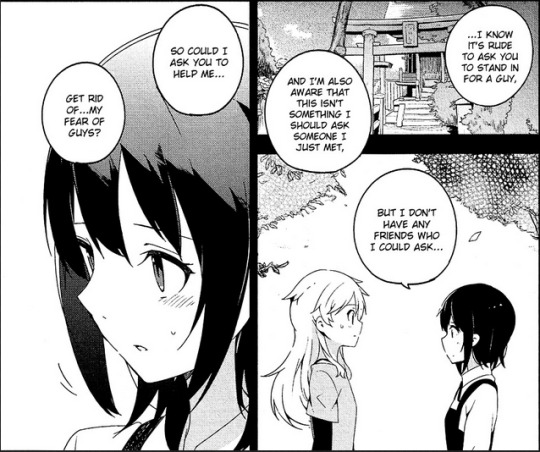
She has androphobia, and she has it bad. So much so she can’t even look at men without snapping violently or becoming physically ill. And Itsuki (♀) is just boyish enough to trigger her, but not enough to lock her down. So she asks for “her” help, to see if she can desensitize herself to her phobia. Itsuki’s in a bind for a couple obvious reasons, not the least being the guilt of deceiving Tokujira. But nonetheless, he genuinely wants to help her. So, he decides to continue crossdressing, diving into a lie that he soon finds he has no easy exit from.
I really recommend this manga. I cannot say that enough times. It is phenomenal, shattering tropes left and right in fun and interesting ways. Do yourself a favor and give this manga a try.
Personal feelings and meta analysis below the cut. It’s, uh, ungodly long, and will get very spoilery. But I will flag spoilers. And there will be pretty pictures?
(Also, no, I did not go into this planning to compare a manga about crossdressing to the abolitionist writings of Frederick Douglass, but reality deserves to be a bit absurd sometimes.)

Before you think I’m getting spoilery, with the intro I gave or anything I don’t mark as spoilers, I’m really not. Everything outside of spoilers is right on the package at the start. It sounds like I’m spoiling late-game stuff, right? That’s something that was really fantastic to me: this manga doesn’t spoon feed you. There’s no arcs of pure silent angst, even at the lowest point in the story. These kids are smart, they think and intuit on the spot, and they share what they’re feeling with each other like good friends do. Like that next panel down there with Itsuki introspecting about his confidence level while crossdressing? That’s from the first chapter! These kids are smart. And god damn that is so nice to see.
There was a lot I liked about this manga, but at the top is how compelling the protagonist and his internal conflict are. Right from the first chapter he’s already wracked with guilt about what he’s about to do: deceive this girl by pretending to be a safe space. But Tokujira told Itsuki (♀) she hopes to one day be able to fall in love, and Itsuki wants to ensure she can have that - even if it’s not him that gets to confess to her. He’s fully aware of exactly how fucked up what he’s doing is, and is appropriately beating himself up over it in a really realistic way. But although the guilt never fades, it slowly gains company in happiness. He enjoys this new, fragile life he has constructed around the two precious new friends he's made as a girl.
It was probably easy to gloss over in the synopsis, but arguably the biggest part of Itsuki (♂)’s conflict is his complex about his face. He looks dangerous, and because of that he is afraid to even lift his head or smile in front of others. But as Itsuki (♀), he smiles and laughs without fear. It becomes immediately clear to him on the first day that he's a more confident person while crossdressing. Happier in a way he can't be as a man.

Botan is easily my favorite character in the series. She’s introduced early on, as Tokujira’s first and only friend before Itsuki (♀). At the start she’s a dangerous third wheel, a serious threat to Itsuki’s ability to keep up his lie. And though the situation is (thankfully) defused rather quickly, she becomes a massive source of internal conflict for Itsuki. Nonetheless, she becomes a dear friend for both Itsuki ♂ and ♀. She’s just so...*chef’s kiss*
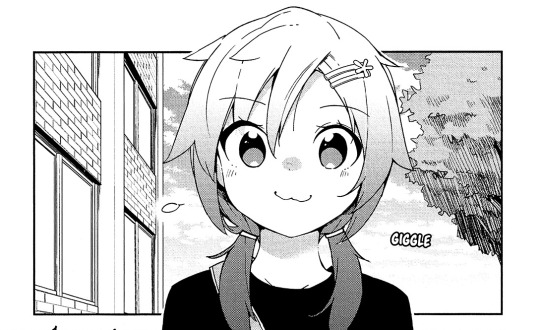
^This face is the repository of all my love and affection.
Mark my words, this is the first and I assume last time I will ever say this: love triangle good. You know it’s inevitable in a romance genre piece, but this manga approaches the trope in a new and compelling way. [Spoiler] Needless to say, it’s between Itsuki, Tokujira, and Botan. But...there’s two Itsukis involved, ♂ and ♀, and in the center of it all is this lie. His lie stops being about him: it's about not hurting these two girls he cares so much about. [/Spoiler]
On a more personal note, I saw so much of myself in Itsuki’s older sister, Ibuki. She runs a salon, catering especially to crossdressers and transwomen. She’s a self-described “Youthling”, an alien from the planet Youth, obsessed with observing the exciting and turbulent lives of the youths of earth. For more or less for the same reasons most of us do: transpeople don’t tend to get the youths we want, if we allow ourselves to experience youth at all. So it’s nice to be able to enjoy it vicariously, through this younger generation that is able to more fearlessly pursue the lives we couldn't.
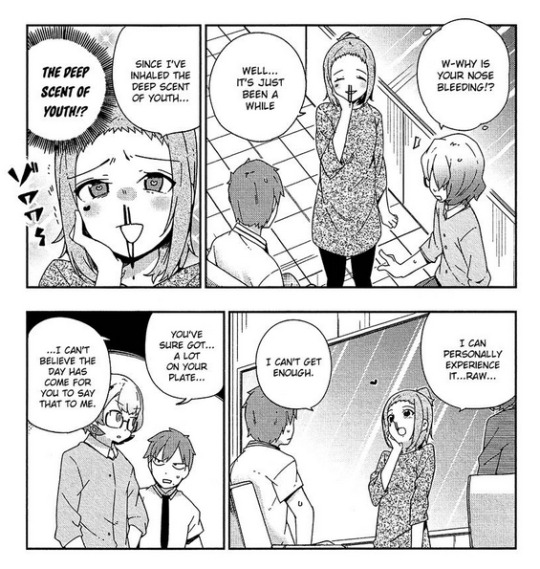
^Incidentally, one of my favorite interactions in the manga.
Despite getting Itsuki into this crossdressing mess, she’s someone he can always return to and confide in, and get good, helpful advice from. Her whole philosophy is to give young people agency to explore their identities and find themselves, and though she tells Itsuki the road he's taking is dangerous as soon as she learns what he's doing, she'll always support him however she can.
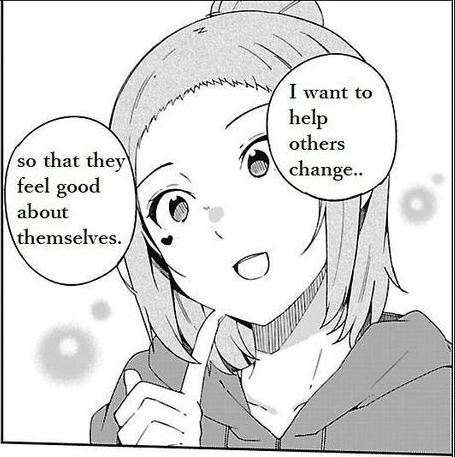
That, I feel, is what separates her from other, more creepy/pedophilic enabler types, like Sawako from K-On! or Lucoa from Dragon Maid. It’s a refreshingly honest and respectful portrayal of a quirky adult just trying to be a good older sister.
The last thing I want to say, and I’m not going to even mark this as a spoiler because of course it’s going to happen and if you can’t predict that then you’re not my problem, is that Itsuki of course eventually has to drop his lie. All I’ll say about it is that it is probably going to live in my head for years. Everything about it, the lead up, the execution, the fallout, and the recovery, are all so masterfully crafted for maximum emotional impact.
That’s all I want to say exclusively about my personal feelings. On to analysis. There will be a lot more contextual spoilers here that, even without reading the parts I’ve specially blocked off will probably leak through. Read at your own risk, but I would recommend revisiting after you have finished the manga.
One thing I really want to talk about is language. That’s right, I’m going to compare a crossdressing manga to The Narrative of the Life of Frederick Douglass, the autobiography of a freed slave turned abolitionist. Douglass talks about a concept that has remained imprinted on my mind ever since I first read it: how and why slaves struggled to comprehend the concept of freedom. This wasn’t anything to do with fear or “racial inferiority” like pro-slavers would argue, but rather with a lack of vocabulary. They have all of these feelings and things they know to be true, but lack the words to make meaningful sense of them. For Douglass specifically, his life completely changed when he learned the word “abolition.” It was like a floodgate burst, as he was suddenly able to put meaning to feeling, create context from chaos.
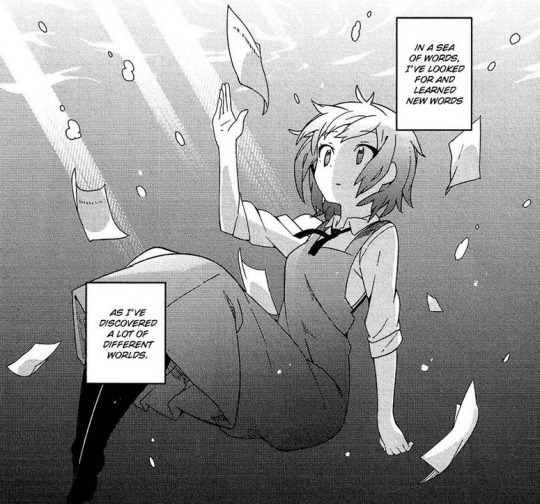

And that’s right, we see that happen in a big way, with Tokujira. This should be an obvious development, but as it happens late in the manga I will mark it [Spoiler]. As Tokujira and Itsuki (♀) practice things like talking, eye contact, holding hands, etc., Tokujira naturally starts to fall for Itsuki (♀). But she doesn’t understand that. An important part of her character is that, growing up, she focused on expanding her vocabulary as much as humanly possible in the hopes of being able to better articulate herself. So words are very important to her. It’s not until she sees a work of lesbian fiction on display that she finally realizes that’s the word she’s looking for. The floodgate bursts, and all of her emotions suddenly make sense. She realizes she loves Itsuki (♀). [/Spoiler]
And I think that is a vital and underexplored concept when discussing LGBT youth, especially in countries where even knowledge of these concepts is taboo. The reason so many LGBT youth struggle with their identities, especially trans youth, is because we do not have the vocabulary to conceptualize our feelings. I am always excited to see this concept play out, especially in this context. It’s such an important thing that needs to be addressed more broadly.
Moving on, I want to talk about historical context of the genre as it relates to what the author did here. Notably, I want to talk about a specific trope rampant in Japanese queer fiction, specifically early lesbian fiction: the idea that queerdom is a meaningless, youthful phase that children will naturally and inevitably grow out of. It’s problematic for obvious reasons.
[HELLA HELLA SPOILERS] My kneejerk reaction to the ending of this manga was that the author fell into this trope. In the end, Itsuki comes to the conclusion that he does not need to crossdress. So again, kneejerk. But...it really wasn’t like that. He never had any dysphoria; crossdressing was always just a necessity of his circumstance. Nonetheless he learned to analyze and value his experience crossdressing as a woman, and because of that grew as a man. And as part of his journey to understand his identity we, through him, see why some people crossdress. Along with his example, we see why his sister, a bona fide post-op transsexual, has made it a permanent change to her life. Likewise, we see Miyama, who crossdresses purely for the gender euphoria, but has no (stated) interest in going all the way. These are all presented as valid and meaningful. [/Spoiler]
Crossdressing, and gender nonconformity in general, is portrayed not as some one-dimensional fetish like cultural taboo would depict it to be, but rather a meaningful exercise for exploring and critically analyzing your own identity. For some, yes, it’s a phase, but an importantly transformative one when done right. While for others, it is a gateway to a new way of experiencing and enjoying life. Or, it’s fun just for the pragmatic reasons...
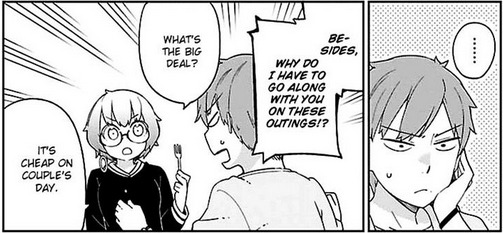
I honestly cannot recommend this manga enough. Tragically, I cannot imagine it ever getting an official english translation, so you’ll have to settle for a scanlation like the one I linked in the title up top (and here, again). It’s a really good translation, though the site is predictably sketchy. Warning for lots of NSFW ads.
Read it, and then come talk to me about it!!! There is basically zero fan community and I need to fangirl with someone!
#long post#and I mean REALLY long post#Ookami Shounen Wa Kyou Mo Uso O Kasaneru#The Boy Who Cried Wolf Also Told a Lie Today#the boy who cried wolf tells a lie today also#analysis
11 notes
·
View notes
Text
The more I see from Mark Fisher the more fruitless his writing seems in terms of actual implications for theoretical/practical future movement of any anti-capitalist politics...like for all his talk of the impotent paralyzed state of a left unable to escape or meaningfully able to learn from its past, beset by circular patterns of discourse and movement it's tied itself up in as a result of cultural fixations/conflicts and stifling insular academic and/or online intellectual developments that are often completely detached from the actual political sphere, unable to formulate an actionable political programme that can genuinely confront power, have no relevance to the social base of a potential anti-capitalist movement, etc, like for all the talk of that shit his own critiques of those things tend to essentialize them as inextricable, even inevitable features of capitalism itself and as a result cultural or intellectual trends that are not intrinsic to but symptomatic of a system based on this particular mode of production, and that develop as a result of the interplay between societal elements existing within and formed by that system in a given time and place, are posited instead as defining features of that system (for example the insistence that regurgitation of past cultural forms must be seen as inevitable features or tendencies of capitalism - and that that alleged fact has some fundamental explanatory power - rather than being seen as trends that have come to prominence, and cyclically have become prominent before as well, due to the ebbs and flows of accumulation of intellectual property & consolidation of productive/investment capital etc and that at times have given way to or existed alongside dominant cultural/artistic movements outside of that retrofetishistic lane. Which like even when that was the case capitalism was still bad...like the problem is not encapsulated by the culture's perceived failure to find the next jungle music, nor would it be solved or meaningfully altered were the next jungle music to be found). And in that process you're bestowing an undue sense of significance upon and giving a completely misplaced centrality to things that you're purporting to be criticizing on the grounds that they distract from and are unproductive when it comes to dealing with the pressing core issues by which we're actually faced, while completely failing to incorporate the breadth of actual political & economic shifts, movements, conflicts, etc both against and in favor of the expansion of capital within your analysis in the same way that the individuals/organizations/institutions that you started out critiquing are guilty of. And that related failure to genuinely consider political reality as it exists outside of certain insular left spaces & discourses as well as the left spaces & discourses being used as the basis for the critique being advanced largely neglects anything that might be going on outside of metropolitan centers within advanced western states (and even then it seems mostly confined to the anglosphere) that might complicate or even outright contradict the narratives being advanced, which idk may also contribute to the tendency to grossly generalize and even essentialize specific aspects of society or culture that have taken shape in the first-world as being endemic to capitalism itself as it exists and must exist everywhere at all times...and even if that's being done based on the view one sometimes sees that as capitalism advances then the societal condition of the global south will come to resemble that of the current north then it's still bullshit because while of course that does and will still continue to happen in some respects, there's no broad convergence of that sort in sight at all and given increased pauperization already in motion as a result of ongoing economic trends and mass migrations as a result of accelerating climate change the future of LA or Berlin might look more like the present in Rio de Janeiro or Mumbai than vice versa...idk like there are genuinely interesting discussions of music and evocative (though by no means novel on the level or either tone or content) descriptions of a certain kind of prevalent malaise and ennui peppered throughout Fisher's work but his analyses of the way those things reflect and/or are produced by capitalism itself either fall off the mark or, again, aren't advancing any ideas that haven't long been circulating either in the marxist critical tradition or in any others that have in differing ways been in some form of dialogue with or have to some degree been influenced by it (even those that either explicitly/self-consciously or not find themselves in opposition to marxism, poststructuralism being probably the most obvious/notorious example) right down to the concept of capitalist realism itself, which as elaborated by Fisher offers nothing that isn't present in the diverse and even divergent analyses & conceptual frameworks surrounding ideology, consciousness, hegemony, the ~real~, etc that were already there in the work of everyone from Marx himself to Lukacs to Gramsci to Althusser, Baudrillard, Jameson, Eagleton or numerous other notable figures even just within the western intellectual realm. Like the only distinguishing feature of Fisher's capitalist realism is his contention that in the aftermath of the USSR's collapse, not only has the social reality generated by capital successfully naturalized itself in various pervasive ways as it has been doing for the past five hundred years, but now there's been a crucial turn in that since 1991 there's been an additionally ingrained negation of our ability to conceive of or pursue alternatives to neoliberal capitalism on a collective level, which allegedly wasn't there before...which like I'm sorry but that's a ridiculous fucking claim to make especially in light of the fact that shortly before his death Fisher said that the movements behind/supporting the rise of Jeremy Corbyn to labour party leadership & the 2016 Bernie Sanders campaign represented breaks in and the beginning of the end of the era of capitalist realism, which like. If that's the standard then how does the latin american pink tide of the late 90s-late 00s, which involved much larger popular movements that were much more firmly rooted in and directed by the working classes and peasantry and that pursued much more radical goals and even in the face of counter-revolutionary forces that have been ascendant in recent years still succeeded in attaining significant tangible gains for themselves, especially when compared to the negligible results that revived new deal democratic or midcentury labour agendas have had so far in the US & UK, like how did that shit not contradict capitalist realism well beforehand...or the fact that in Cuba the first post-Soviet decade entailed a renewal of genuine socialist energy & societal transformation of a kind not seen since the first 10-15 years immediately following the revolution, or on the other end of things, the clerical authoritarianism that existed in iran already at the time, or the terrifying rate at which the genuinely fascist RSS consolidated popular support and came to have an increasing hold over the various institutions governing Indian society, especially since the early 90s, until at this point there's no significant challenge to their power within the second most populous country in the world...like all those things seem to be much greater refutations from so-called capitalist realism to the point that the concept seems to have no meaning or utility at all...like whether intentionally or not, Fisher's ~acid communism~ basically leads to the same endpoint, perhaps with different aesthetic trappings, as FALC bullshit, where residents of the first world are freed of the labor and alienation of the past by a super expanded version of the welfare states created by postwar european social democracies and can both go to raves and consume as often as we want. The problem wasn't the violent abstraction of commodified life, the value form, whatever it was that we couldn't pursue and indulge in the thrills and pleasures that per my mans Lyotard & Nick Land are undeniably present in capitalist consumer society except now we can, thanks to those beefed up fully automated welfare states, those indulgences are no longer simultaneously a source of malaise and depression as they previously were when the free market barred the masses from partaking of them with the freedom and reckless abandon that are necessary in order to give us that truly liberated libidinal fulfillment. What the effects of the magically automated extraction of the natural resources necessary to maintain that steady flow of goods and resources to the fully automated luxury acid communists might be on the environment, how that might impact the people that live in the places where extractive industries tend to be based, how they might fit into this acid FALC utopia, whether they'd be forced into ever more menial forms or labor building or providing upkeep for the robots that replaced their former fellow proletarians in the first world, whether their labor might itself be the supposedly 'automated' part of fully automated luxury communism, whether they might legally be recategorized as robots so as to prevent that seeming contradiction from shaking things up, no need to trouble ourselves with that
49 notes
·
View notes
Note
I found this in chapter 56 and I thought it was kinda interesting. While Zen is comforting Shirayuki as she's crying, Mitsuhide says,"But this is about Zen and Shirayuki. I don't think this sudden distance is a big problem. It's not like being apart would cause their existence to become smaller in each other's lives." Maybe it's foreshadowing they will separate? What are your thoughts on this? Do you think ObiYuki still has a chance or is it just the author toying with us?
hi anon!! ( ̄ω ̄)
Short answer:
Yes, Whoaboy get ready I have some THOUGHTS, YESS!! and No.
I have been sitting on this ask for a long time sorry for le wait
The vast majority of this post is below the cut. I hope it is not too much / addresses what you meant.
Here are some notes before I subject whoever reads this to my madness:
These little moments of “It’s okay to do what you want to do” always strike me, and I think about them when I’m considering Zen v Obi endgame because it opens up the possibility that things can change.
Yes it’s a shojo and shojo protagonists tend to stick with their initial love interest... blah blah blah. I don’t think this preconceived notion of how shojo manga ‘always goes’ is a valid point anymore.
So .... I think the comments we are both thinking of usually refer to Shirayuki’s Path and how she must be able to Stand By Zen’s Side as an Ally, etc. So I’ll kind of be thinking of this from the angle of a Journey.
Everything discussed is also after The Play We Believe is Foreshadowing (except for the panels pulled from ch 9 and 20) which I think should be considered for the context of the plot.
If it is actually foreshadowing for an eventual Obi & Shirayuki story arc -- which tbh we might be in the midst of (currently) at ch 117 without realizing it -- then it’s relevant to how we frame the comments made afterwards. At the end of the day, Akizuki-sensei is an author. She is telling us a story. I think it’s reasonable to seek out clues to foreshadowing in fictional stories. So I’m operating under a 90% certainty that the play is foreshadowing.
I have found that the best (fictional) stories are ones that have been planned carefully. I have no way of verifying if AnS has been so precisely crafted to weave in so much foreshadowing that we speculate over, but damn it sure feels like it was.
The manga was originally just the first chapter, so we can assume that after writing that chapter and deciding to make it into a series, there was some planning done.
ANyway............... strong speculation ahead. I think I was ~60% thorough in my search to find material relevant to Foreshadowing of a Separation.
Please enjoy!
1) So we’ll start with a panel from ch 9,
where Zen is considering his relationship with Shirayuki and his growing crush.
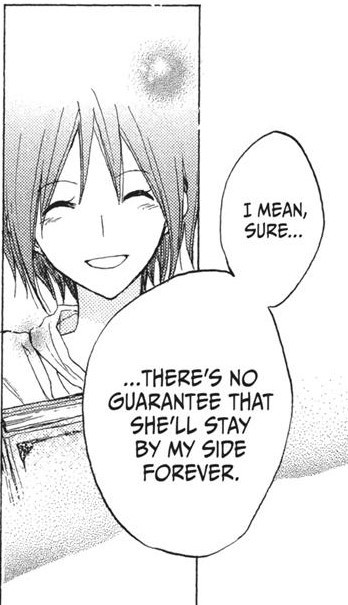
This panel is, as stated above, part of the story that Akizuki expanded on after the original one-shot. In the first chapter, we get a lot of cute fate-chitchat between Zen and Shirayuki, but I think -- after deciding to continue the story -- Akizuki changed the tone to allow for more character development, and to challenge the Fate tropes often seen in romance.
Thus, the statement above from Zen that they may not always be together.
foreshadowing ?! ( ˙▿˙ )
___________________________
2) In Chapter 28,
we have the crew essentially saying they are all growing stronger for the sake of each other, and lending their strength as needed.
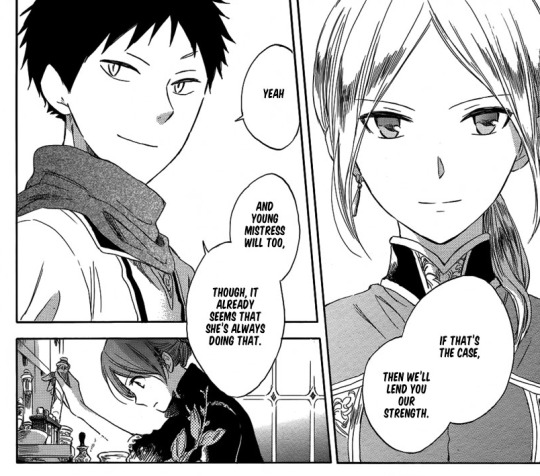

Within the story, Akizuki-sensei has established a theme of moving forward and changing as needed as a way to get stronger.
Mitsuhide says this to Shirayuki, also in Ch 28:

Why .... does Mitsuhide look so serious as he says this to her? Is he reconciling the fact that Shirayuki and Zens paths may diverge at some point, as they do for the Lyrias arc?
He follows up the above statement with:
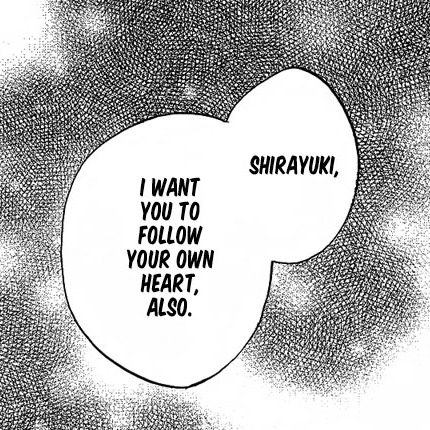
He goes on to say,
“I want you to follow your heart so you can stand on your own wherever Zen takes you.”
So... maybe that context takes away some of the significance for fellow lovers of AnS. But I don’t think we should just ignore the statement.
I think she’s being given permission to change her mind; that it’s okay for her to have feelings for Zen, but it’s also okay if she chooses to end things. Mitsuhide will support her either way.
Even though the the full remark still has to do with Zen, she is being encouraged to stand on her own. She is her own person. She has friends who will still be there even if she chooses something different from what people expect of her.
In this case -- pertaining to AnS as a whole, from the perspective of everyone who ‘knows’ about ZenYuki in-story and also (meta!) the manga readers -- Shirayuki is expected to someday marry Zen.
After this, in Chapter 29, Izana is a bit derisive to Shirayuki after she gets the title from Tanbarun. I think his comments are intentionally made to make her uncomfortable. He says,
“Hahahaha! What an unusual title! Amazing!”
- cue confusion from Zen and Shirayuki -
“I wasn’t poking fun at it, it’s just a bit strange. Hmm... before, I said a nobody like her at your side would sully your name, Zen, but with this you can be friends without any such worry, right?
“Shirayuki, I’ve never asked what kind of relationship you want to have with Zen. And I don’t know if it’s something that can be said.”
Alrighty. So. Izana says in front of Shirayuki that he had described her as a nobody. This seems like something said meant to disquiet her, and her initial reaction is, “taken aback,” so we can safely say it was at least temporarily disconcerting for her to hear. I imagine it’s hurtful to hear you were once thought of as someone unworthy of notice.
Don’t get me wrong, I think most of what Izana says and does is in relatively good faith. I think the fandom has come to a general conclusion that he’s testing their relationship.
Obi finds her in the early morning and he notices that she’s upset, commenting that she’s making a strange face. She is still thinking about what Izana said, and Obi asks,
“Is it about the path you want to take?”
“....No. It’s that I haven’t given it any thought.”
Zen already wishes (though I don’t think he’s explicitly stated it the way he does later in ch 33) to marry Shirayuki, and we see her here facing emotional turmoil because that part of her future isn’t something she has thought about yet. Interesting, to say the least.

I’m not really sure about this, but it seems like she either means where Zen is taking her and / or where she can stand on her own.
And then .......
“Obi, will you lend me a hand?”
“Didn’t I tell you before that I’ll take you wherever you want to go?”
This part of the story is still heavy ZenYuki, but I think Obi saying this to her right now is significant. Akizuki has repeatedly weaved Shirayuki’s path into the themes of the story so far, while contrasting that Zen will meet her at her destination, while Obi will be at her side for the journey.
Zen and Shirayuki meet and talk. They basically address that Shirayuki doesn’t really know what the future holds, but that she still wants to stand by his side, and says that even though he’s a prince she wants to think it’s okay for her to feel that way.
You almost forget about the significance of Obi and Shirayuki’s relationship when it’s followed up by this ZenYuki scene. I wonder about the aforementioned nature-of-planning involved in the story and the future of the characters at this point.
gnah how did this post get so long already
___________________________
3) Zen has presumably given his blessing for Obi to be happy in love
In chapter 31, while the group is stranded outside Wistal due to rain, Zen and Obi are in the bath talking about the possibility of Kiki and Mitsuhide getting married.
“It’s fine with me as long as they can say that they’re happy. I intend to make sure of that.”
“You’ll make sure of that?”
“The same applies to you too, Obi.”
More foreshadowing? Presently it seems that the MitsuKiki ship has sunk, so contrasting this conversation to current-manga-events is titillating to me. ESPECIALLY because Zen says that he wants to make sure Obi is happy when Zen knows how Obi feels about Shirayuki. So it’s established that they will support one another as friends.
Later, Kiki and Mitsuhide are talking after dinner and discuss how the nature of Zen and Shirauki’s friendship never changes (that’s the impression I got from it). Mitsuhide recalls when he and Zen talked about the same thing:

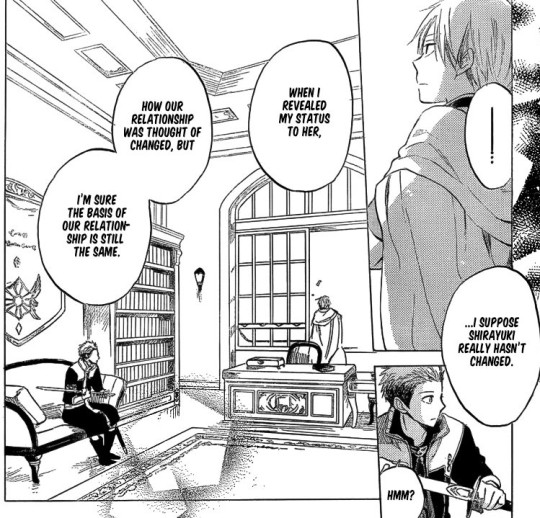

I think what Kiki and Mitsuhide are referring to is that Zen and Shirayuki have made a conscious effort to become friends despite the barriers they’ve encountered so far, by way of them showing the strength of their mutual respect and desire to aid one another. I get a similar feel from the conversation between Zen and Mitsuhide.
And then .....
“The two of us will always be friends.”
ahem
Zen saying this -- in context to everything from the past four chapters -- implies that Zen is okay if their relationship is not romantic. If it is true that the mangas plot was deliberately planned out, these chapters will become increasingly interesting to look back on as the plot progresses.
The direction of the story has changed since then if we are only looking at the big turning point of Mitsuhide rejecting Kiki.
And despite that rejection, the group is still a group despite their physical distance.
___________________________
Brief note to say that in Ch 33 Izana says to Zen,
“Let me be an ally as you and Shirayuki follow your own path.”
While this is a ZenYuki comment, I see it as Akizuki reinforcing that each character is following their own path and they will be supported as they do.
___________________________
3.5) After this point is the first Lyrias arc,
where obiyuki shippers are starting to salivate over how much is packed in just for their relationship. I mean .... remember when she pushed him to the ground because she thought he would get hit by snow? And he gives her those moony eyes just like it didn’t stop ... my heart
UGH JUST SAYING IT BECAUSE context! Shirayuki’s path is changing slowly, and Obi is still by her side.
___________________________
4) A period of transition
I think this is around the time the Bergatt arc is actually beginning, leading up even to current-manga-events.
In Chapter 53
And thus, they head towards the path that a new wind blows upon.
The times are changing.
While Shirayuki is preparing for her and Ryuu’s move to Lyrias, Zen and co. are at Wilant meeting with Haruto, who describes fools aiming to throw the country into turmoil. This is a seed for the plot that develops, ie, the Bergatt arc that was not actually resolved when Touka gets taken down at Sereg in ch (?) 86. I bring this up because I think it shows the level of planning that Akizuki has put into the story at this point.
In chapter 55, after Shirayuki has finally been able to tell Zen she’ll be away from Wistal for 2 years, and they have this conversation (slightly paraphrased) after he’s processed for a short time:
Zen -
“Sorry. The fact that you would be leaving the castle was something that I’d never considered. So my reaction was a little slow.
“I’ll hear it. I’m sure there was more you wanted to say.”
Shirayuki -
“I’m really glad that I got to meet you and come to the castle! I’m where I am now because I wanted to become Zen’s ally; and i achieved that by coming to the castle and becoming a royal pharmacist.
“I’m sure that, like how it’s always been, there’s something ahead connecting to my path now. That’s why, because there’s a place I have yet to go, I want to be there.”
This is Zen’s face after she says the above:
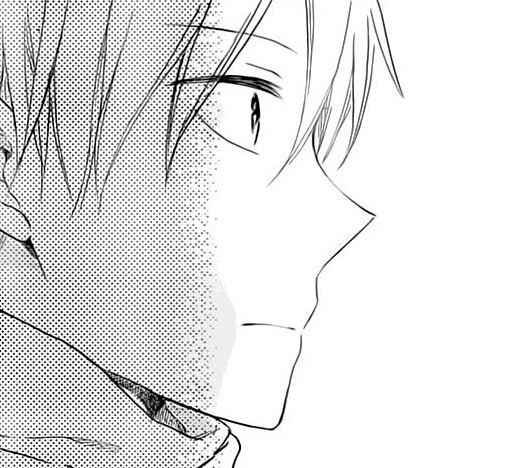
What is he thinking? Is he worried about their romantic relationship? I interpret it as preemptive disappointment that they may not stay together.
Shortly after we get to the point you made in your ask (sweet anon) re ch 56 with Mitsuhides comment. This adds to the reinforced theme that change is okay and they will all still be friends and allies regardless of where life takes them.
BUT IMMEDIATELY AFTER Mitsuhide says that in reference to Zen and Shirayuki, Obi responds:
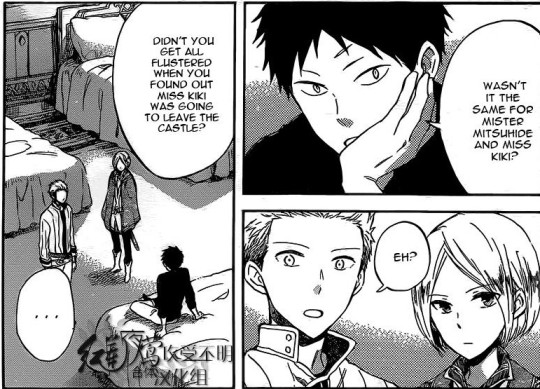
Is Akizuki drawing a parallel between MitsuKiki and ZenYuki? No idea. maybe. But somehow I do not find it coincidental.
This seems like a MitsuKiki hint, meant to fuel the ultra-shippable pair that we all loved... but after the rejected proposal, it’s hard not to see the whole situation differently re: zenyuki / obiyuki and mitsukiki / hisakiki.
Then the first true ObiYuki hug, and this:
“It feels as though Obi might suddenly appear in Lyrias!”
girl you already knew. Shirayuki knows that Obi will follow her.
Obi deliberately postpones going to Lyrias, though, in order to consider his feelings for Shirayuki and how to tell Zen.
Then!! in 58-59 we get long-awaited confirmation from Obi that he has feelings for Shirayuki, and after this beautiful moment Obi goes to Lyrias to be at Shirayuki’s side, and after everything that has happened so far that is a clincher for me regarding our beloved Foreshadowing.
While discussing Obi’s crush on Shirayuki, Obi asks Zen
“Aren’t you going to propose?”
“.......................Well, I’m.. making her .. wait.”
“Master ... I don’t recommend postponing it, you know.”
I wonder about this comment. Is this a clue for us that Zen postponing engagement is going to be a negative thing in the future?
idk maybe ╮( ̄ω ̄)╭
Either way ........ This transition period, in between Lyrias 1 and 2, shows us that the story is changing.
___________________________
I have definitely not covered all of the possible moments of foreshadowing and am actually going to leave off on that topic for the time being. I might do a part 2 as its own post.
But for now I will switch to previously mentioned point that...
5) Obi and Shirayuki’s paths are walked together
I think the following two panels are a great way to frame their relationship. Chapter 20 in early Tanbarun arc:
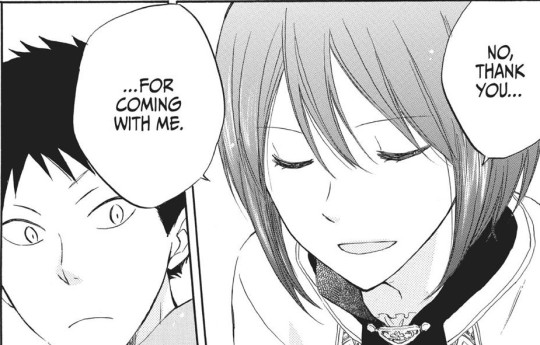
And then, much later in chapter 106 as they stand by the fire and Shirayuki tells Obi he’s handsome in the light:
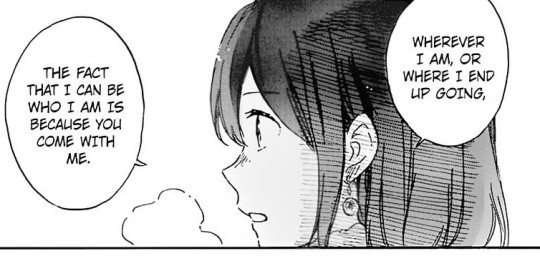
“... because you come with me.” ( ╥ω╥ )
And then more delightful talk from chapter 104 that I think is ... gasp
foreshadowing !!!!!
They are having this discussion after they’ve found out about Kiki becoming engaged to Hisame.
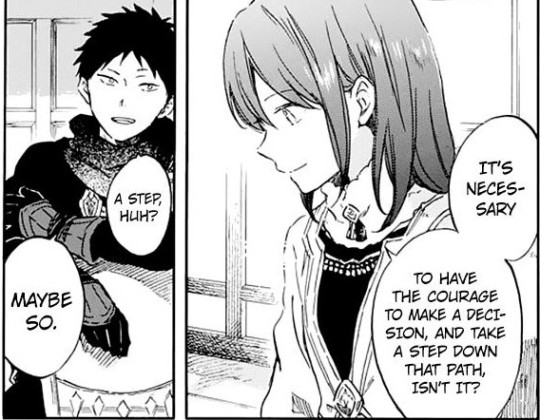
“It’s necessary to have the courage to make a decision and take a step down that path, isn’t it?”
Shirayuki is possibly saying this due to the implications of Kiki’s letter. Kiki has made the choice to take a new path from the one she had been on by marrying Hisame.
So what about Shirayuki’s journey? Has her growth led her to a path she didn’t expect, and now it will take courage to step down it?
In recent chapters Shirayuki is shown to be seeing Obi differently and as a man:
overhearing him calling her beautiful and being surprised that he is embarrassed she heard
witnessing him going to a marriage meeting
that little moment where he is holding her wrist as a Lyrias knight tells him that the knights sister wishes him luck in love
the firelight comment oh my god
realizing she lost the pin Obi gave her and tearing up as she literally stared at him; upset that the gift she cherished is now missing and potentially realizing how very dear to her Obi actually is
fake dating and the 10 seconds of ... just... I still cant even
Obi is the one who is by Shirayuki’s side. They developed a bond through years friendship that is now being reframed by Akizuki. The nature of their relationship has been slowly changing and I think we approaching a time in the manga where Shirayuki will realize it.
___________________________
To answer your last question ... I do think ObiYuki has a chance and I do not think the author is just toying with us. I’ve talked a lot about my ObiYuki Endgame feels in previous posts/asks. I could probably talk about it forever but this post is absurdly long .... sorry
Thank you so much for the ask! and wow thank you so much if you actually read this whole thing!
<3 beebs <3
#obiyuki#obi x shirayuki#speculating#so much speculating#ask beebs#i dont think this is even my longest post#that may be an issue#ans#akagami no shirayukihime#obyuki#meta
70 notes
·
View notes
Text
TWD 10x16: A Certain Doom
Hey Everyone! What did you all think of the TWD episode? Unfortunately, no Beth, which sucks. But I noticed a lot of encouraging things. Today, I’m going to talk about broader ideas and symbolism that I noticed. Tomorrow I’ll do details and dialogue. And on Wednesday, I’ll talk about episode 1x01 of The World Beyond. Sound good?
By the way, sorry if this feels a little loopy. I should have done one more read through/editing pass, but I had WAY too much going on this weekend. So it just didn’t happen. 😉
***Spoilers abound below. Don’t read any further until you’ve watched!***
4 Pairs Pushing Through the Walker Hoard
So, for the pairs walking toward through the walker horde. The first time, I wasn't entirely zoned in on what was going on. Just one of those things where you're watching to see what happens and not really analyzing things. But I was thinking about it before I re-watched, and I had a lightbulb moment.
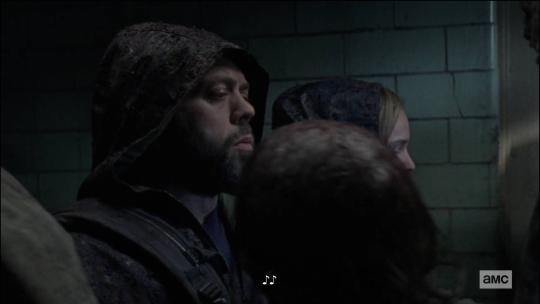
I realized there were four pair who walked through the hoard. The pairs were Daryl/Kelly, Carol/Beatrice, Jerry/Magna, and Luke/Jules. And the more I thought about it, the more I started to fall down a rabbit hole. Here's what I'm thinking. In a very broad, thematic sort of way, I think these four pairs represent the four death fakeout couples.
First of all, we had lots of Bethyl symbols going on in the scene. The one that will jump out at you most obviously are that Luke and Jules hold hands a lot like Beth and Daryl did in Alone. To be fair, they don't actually interlaced fingers, so that's different. But it looks the same. They’re walking side-by-side and the camera pans down so that we can only see their arms from the elbow down and they clasp hands. So of course I instantly thought of Bethyl there.
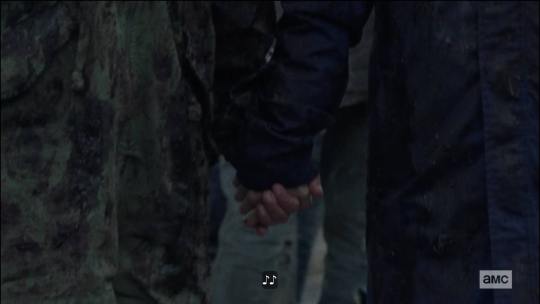
Now, when I watched the first time, before it occurred to me about four death fake out couples, I kept thinking Kelly was really close to Daryl. I mean, she's practically on top of him the whole time. Almost pressed up against his back. I registered that without drawing any conclusions about it. But now I'm thinking that if he and Kelly represent Daryl and Beth, this might almost be a representation of the Sirius piggyback.
And I even tried to play devil's advocate, wondering if maybe all the pairs were doing that. Because they are definitely staying close to one another to watch each other's backs and keep from being separated in the hoard. But I watched really close the second time, making note of what each pair did, and none of them are doing that except Daryl and Kelly.
Luke and Jules hold hands, but they’re standing side-by-side. Magna and Jerry are actually pressed pretty closely together, but again, it side-by-side. It almost like their shoulders and the sides of their heads are mashed together, but he's really not walking behind her in the same way Kelly is behind Daryl. Beatrice does walk behind Carol, but once again, she's not pressed up against Carol's back. She's like 18 inches behind her. So it really only Kelly and Daryl who are doing this. So, the idea is Kelly as a stand-in for Connie, who is a stand-in for Beth. LOL. I get that starts to sound like 6° of Kevin Bacon thing, but there it is.
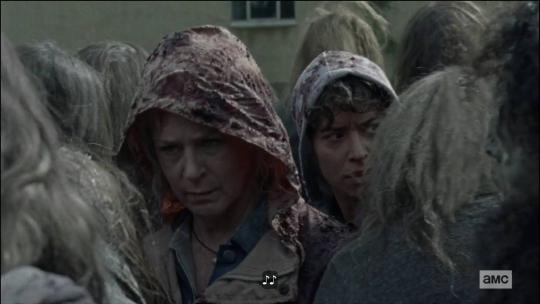
The next reason I think this represents the four death fake out couples is that three out of four of them make it through the hoard without a problem. Daryl and Kelly, Luke and Jules, Jerry and Magna. And what do I keep saying? Three out of the four death fake out couples will make it to the end of the show and be happy together. Bethyl, Richonne, and Carzekiel. The one that doesn't is Glaggie, because Glenn died. So that means Carol's pairing with Beatrice represents Glaggie. One half of the pairing is killed, and doesn’t make it to the end/other side.
Lydia’s Role:
Luke isn’t creating a bomb as early spoilers predicted. He's just putting together the radio that will blare the music. So, the plan is to get the radio, powered by batteries, to the wagon which will be drawn by two horses. Then blare the music from the wagon and use it to draw the walker hoard away from the hospital and toward the cliff. So, it's very similar to what they did in 6a in leading the walkers away so that everyone lives.
At the beginning of this episode, when expanding this plan, they say that they have to go through the walker hoard surrounding the hospital in order to reach the wagon and horses. That's why the four couples are going through the herd to begin with. These are the eight people (eight is a baptismal number by the way) who volunteer to do it.
They put all the parts to the radio and battery that Luke has into these black backpacks. We see them all carrying the black packs through the horde. When Beatrice goes down and dies, she tries to give Carol the backpack, but Carol doesn't get it. And I have a feeling people will hate on Carol for this part because it does kind of feel like she's leaving Beatrice behind. I don't think that's actually what they're going for in the show, though. If Carol had gone back for it, she would have been eaten, too, so she simply couldn’t.
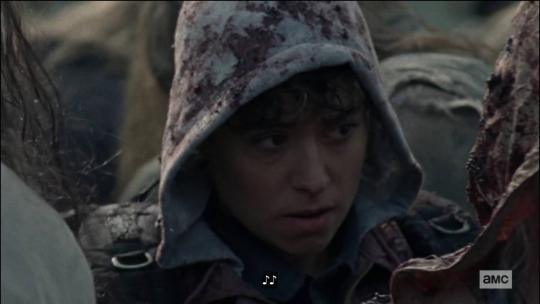
But it would've been a really bad thing to lose Beatrice’s pack because they needed the parts that were in that backpack to make the radio work. So, my first thought was perhaps the black bag being left behind could be a parallel to Beth's black bag being left behind in Alone. And maybe it still will be on some level. But then something changed.
After the bag gets left behind, we see a hand grabbed it. At first, I thought it might've been Beta picking it up. But it wasn't. It was Lydia. She and Negan originally stayed in the hospital, but when things started to go bad, both of them put on Whisperer masks and made their way into the horde to help. So where Carol didn't get the bag, Lydia made her way through to where Beatrice dropped it and picked it up. She brought it safely to the other side with Carol.
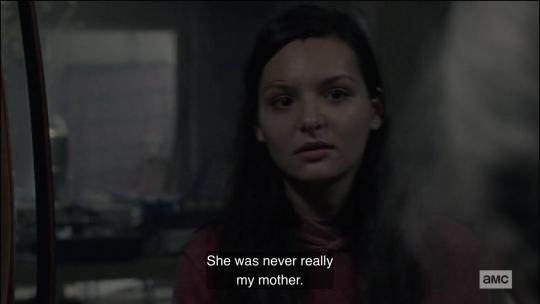
I think this is very significant. While I do think that Carol and Beatrice as a pair represent the fate of Glaggie as a couple, throwing Lydia into he mix is interesting.
I think she represents Beth. Think about it this way. Lydia was originally left behind in the hospital (literally, the Grady Hospital), but she sort of escaped on her own (down through an elevator shaft with Negan) and showed up to bring something to help team family. She brought them "something they needed” in order to save their people.
So I think it goes very well with what we’ve theorized about Beth in the past. She will save everyone somehow, show up to be a weapon to help TF. And on top of that, throughout all the last episode in this episode, Lydia is dressed in a pink hoodie. And then there's the fact that that what Norman posted last night had Emily wearing that bright pink jumpsuit with blue flowers. Just saying.
Lead the Walkers Away with Music
I thought about this thematically. And it’s not anything we haven't discussed before, but I was just thinking about it in more depth. They lead the walkers away and eventually to a cliff where they go over the side and into the ocean. So obviously, the water is a big deal. But I was thinking that we have a situation where they're basically trying to neutralize the walker threat that is about to kill the group, right?
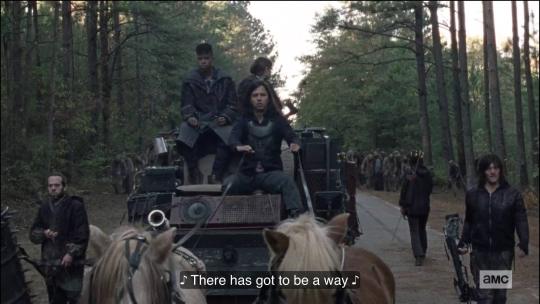
Well, the music they're blaring becomes sort of a passive aggressive weapon to take out the walkers. It's not direct and aggressive as a knife or bullet would be. But they're using the music as a weapon to lead the walkers away, which will end up saving the group. And obviously Beth equals music.
So, it's kind of an overall theme that we've seen before. It also occurred to me that we could compare this to Rick's speech in 5x10. His whole, "first we have to survive, then we get to live." Especially when the four pairs are going through the walker hoard, it's kind of like Beth and Daryl going through the graveyard. They’re sort of straddling the line between life and death. And if they can survive it, then they get to live. So that's what I was thinking about there.
Now, the plan doesn't really work. It gets dark while they’re leading the walkers away and we see a full moon. But the remaining Whisperers ambush them. They manage to throw some sort of metal wire across the road and it kind of kills the wagon. In fact, the wheel comes off.
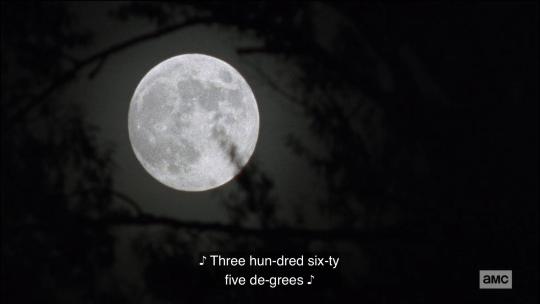
Side note: there are two blatant examples of wheels falling off in this episode. The first was with Eugene at the beginning when he has biking accident. The second is this part with the wagon. The camera focuses very obviously on the wheel falling off in the road. (This is a theme we’ve seen A LOT around Bethyl symbolism.)
When it does, the group has to abandon the wagon and make a run for it. I actually watched closely the second time because I wondered what happened to the two horses that were leading it. After the wheel falls off, we simply don't see them again. The camera doesn't focus on them. I'm assuming they got eaten by walkers, though, because Daryl’s group definitely didn't stop to rescue them. They just run into the woods. Then we see walkers converge on the wagon, so I'm assuming they ate the horses. Kind of like Buttons.
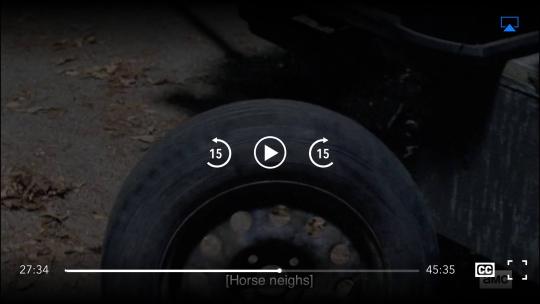
The problem is, once they don't have the music to lead the walkers away anymore, they know the Whisperers will turn the hoard around and take it back to the hospital. So the only thing they can come up with to do is to go back into the horde and hunt the Whisperers so they can’t do that. This is what they do. And this is where Beta is killed.
In fact, it's kind of interesting. Negan gives Lydia Alpha’s skin mask. It definitely looks different on her than it did on Samantha Morton, but she's walking through the horde looking like Alpha. I didn't entirely register it first time, but Beta sees her wearing Alpha’s mask and tries to kill her. He doesn't get very close or anything, but he goes after her and that's when Negan shows up. So Negan basically saves Lydia from Beta. But then Beta gets the better of him and has him on the ground and is about to stab him and that's when Daryl shows up to stab Beta through the eyes. I got a screenshot of that. Apologies in advance. It's kinda gnarly. But we see Beta actually pulled the knives out of his own eyes. Yeah, that's gotaa have some symbolism behind it.
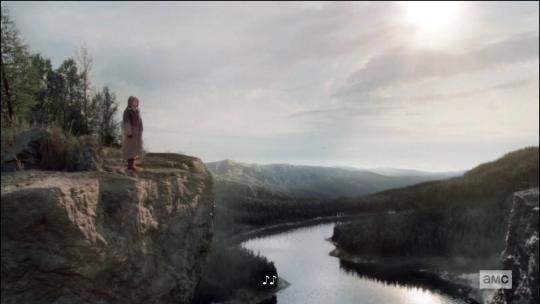
After that, we see Lydia leading the horde toward the cliff. Carol whispers to her and tells her to go back and that she'll take care of it. And Carol really does try to commit suicide here. So, in terms of the stupid shippers, at least we could argue that Carol really isn't very devoted to Daryl. Not only was she going to leave him again, but her suicide would've absolutely devastated him. She was gonna do it anyway. But Lydia pulled her back.
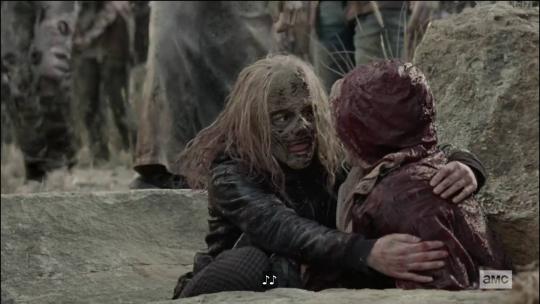
Now, I said this was really powerful and I think it was. I think it’s significant that it was Lydia who saved Carol, not Daryl. Daryl can't save her. Not really. She either has to save herself, or the other thing that I'm starting to realize is that the children can save her. I wouldn’t have thought Lydia would take on that role. Lydia definitely has a child/adult relationship with Carol, but she's not a little kid. And this is someone that Carol will forever associate with Henry.
So, you wouldn't think Lydia would be able to save Carol. But here, she very obviously does. Not just physically, but emotionally as well. Carol starts to cry and says “thank you” (really want to relate that to the Glenn/Nicholas thank you) and the two of them hug each other pretty fiercely on the side of the cliff. It was very powerful and touching, but the point is, it wasn't Daryl that saved Carol. It had to be Lydia.
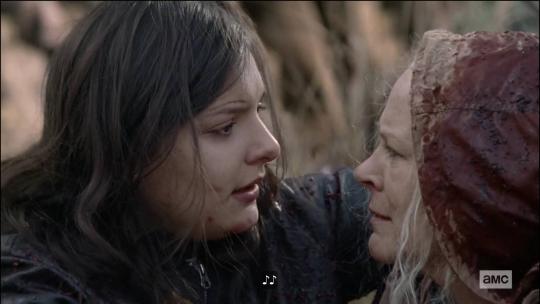
After that, they had back, and this is where we get some reunions. Everybody's hugging, Maggie is introduced to Gracie and then hugs Judith. And this is where Carol and Daryl talk and hug as well. I'll give you the dialogue in a minute. I was pretty close to what I said before, but my wording wasn’t exact. The one thing I want to say right now, though, is that when Carol says the line, "we still have things to do here," it immediately cuts to Connie's scene.
Connie’s Appearance
Now, there's a lot of interesting things about Connie's scene I want to talk about. But the fact that Carol says that, and then we see Connie feels really on the nose to me. It felt like the writers hinting that some of the stuff they still have to do has to do with Beth’s return. Because Connie is very obviously a proxy for Beth at this part.
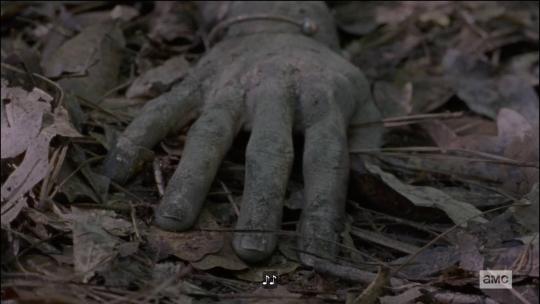
For Connie’s scene, we first see what looks like a disembodied walker hand. It’s unmoving and caked with dirt. But it starts to jerk and then move and then the camera pans back and we see that it's Connie's hand. She has basically face planted in the dirt and she's covered with dried mud and leaves. It's obvious that she's injured, weakened, and probably dehydrated. I also noticed that she has a trail of blood down her face. Which means it must come from head injury somewhere up near her hairline. Not unlike Eugene’s, actually.
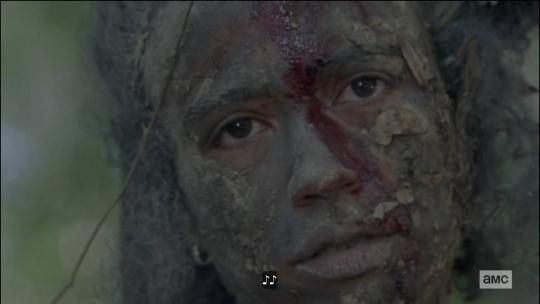
Now, we already know Connie is a Beth proxy. Just to review, she went missing, was presumed dead, and Daryl doesn't know where she is currently or even if she's alive. And that’s on top of everything else we’ve seen throughout the season.
Now we have Connie alone, injured, stumbling through the woods, maybe from head injury. I couldn’t tell if she had any injuries to her legs or ankles. It really might've been weakness and dehydration that made her stumble, but it did seem like she was limping a little bit. I'm even reading into the fact that she was sort of hugging the trees. I mean, she’s actually using them to stay upright and not fall down. But she’s practically running into them and wrapping her arms around them. Visually, it reminded me a lot of Beth having her back up against the tree in Still.

Finally, Connie loses her balance and basically face plants in the dirt again. Then we hear horse hooves and that's when Virgil approaches. I told you before, I didn't think we'd seen the horse. And we didn't see the face or body, but there's a part where Connie is in focus in the foreground and we see the horse approaching, out of focus, in the background. So basically just the legs/fetlocks. And the horse is sort of a brownish-red in color. Then Connie looks up at Virgil and he down at her and that's the end of the scene.
Some thoughts on Connie here. TD has always had theories that someone might've saved Beth and taken her back to Grady, right? For a long time, I was convinced it was Morgan. And it still might be. I’ve moved away from that theory somewhat, but I haven't completely ruled out. But whether it was Morgan or not who saved Beth, I think we have representation here of someone finding Beth staggering around in the woods and saving her life.
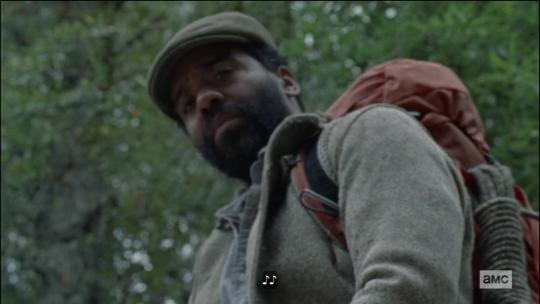
In this case it's Virgil saving Connie, and we can also deduce that this happened somewhere around Oceanside. So that's important too, but again, it's very obvious to me that she's a Beth proxy here. Missing, presumed dead, head injury, stumbling around, and then someone finds her and saves her life. So it will be very interested to see where this goes.
And then there’s the whole Dante/Divine Comedy angle.
Okay, I’m gonna stop there. But there’s tons of dialogue and details to consider and I’ll go over them tomorrow. Stay tuned!
#beth greene#beth greene lives#beth is alive#beth is coming#td theory#td theories#team delusional#team defiance#beth is almost here#bethyl
22 notes
·
View notes
Note
So I read your reply to Nyarisu's comment on Lionheart and I'm really intrigued by your comments about how people understand punk compared to what it was initially. Could I possibly ask you to expand on this? Pretty please?
Yes you could! This is a very (very?) personal point of view and I know a lot of people will disagree, but here goes nothing, I guess. If you disagree with me (and somebody will), that’s fine, but I will not engage with anything that’s not a constructively put argument. I’ve spend too much time thinking about this for a “I don’t like what you’re saying and that’s why you’re wrong” anon to change my mind. Just putting that out there - with love 💜.
The thing is, especially on tumblr but I think just in generally aswell, the idea of punk is presented as this ... Robin Hood kind of thing. Beat the system, stand up to bullies, live your own truth, all of that, but it always is presented as something that is supposed to come from a ... dare I say, nice place? Like those pictures of people in studded and sprayed leather jackets rescuing puppies. All of that, you know? And I don’t want to say that is wrong, because it isn’t, and I love the idea of that, it’s just not the entire truth.
Especially in the early to mid 70s, when arguably punk started, there was a lot of fatigue between an old and stuffy establishment and the lovey, dovey peace and love “let’s all be happy” movement of the hippie scene. I was at Force Attack in 2006, which is a punk festival (and possibly dirtiest place in the world) that got established in the early 90s and went on til 2008 (?), and even then some of the “death to hippies” sentiments ran pretty deep. And I know the counter argument to that will be a well meaning “well, that’s not real punk,” the problem is that I think it actually partly is. (Please keep the partly in mind for the rest of this argument.)
The problem with having the exact choice between “get a good job, built a nice house, think of what the neighbours will say, and don’t ask me about what I did in the war” and “we’re all a big part of one human family, and isn’t nature beautiful, lets all make peace, and btw we would have never done what our parents did” is that both models aren’t a sustainable life style for everyone. That’s why you get alot of people saying this is all fake bullshit, and they start being purposely offensive. This is why you get alot of Swastikas around the sex pistols, you get all these artists singing about suicide and incest and rape. It’s not that uncommon for some of those early acts to play with Nazi imagery, or claim that homosexuality is disgusting (despite the scene always being full of LGBTQ+ people), or idk, thinking it’s fun to piss on someone while they’re asleep. It’s alot of outcry, of saying life actually is this shitty and disgusting and I am gonna be that because in a way you will hate me either way. And it’s not always nice. Disdain and hate and petty selfishness are common human emotions and many of them are low and unhealthy, and honestly not nice or helpful or inclusive, but they are there, and I think alot of that early spirit was just about stopping to pretend that they don’t exist.
I think a reason for why we don’t think of the scene that way anymore is that many people very quickly outgrew that, and said “actually, we’re better than that, that’s not who we actually are. I sadly can’t find that interview right now, but Die Ärzte are actually a good exemple of that and they even admit it themselves, that there was a sense of “enough with the happy hippie bullshit, let’s disgust them” and then later going “uhmm - maybe that went a bit far.” I mean offensive or not, but ultimately a scene that is centered around artistic expression always ends with that question of creation, maybe like “if the world isn’t like what we want it to be, how do we make one we like?” - and then you end up with having to come up with answers that are more than just destruction. And then it turns into something else - something that I think is alot more like what tumblr seems to think punk is. And that’s a wonderful thing. Still - a side of punk, whatever that is, has always been what people like GG Allin (please read the wiki for context) have taken and pushed to the limits, and it just - isn’t nice. And here is where things get a bit tricky.
Because against that backdrop, things like John Lydon (Johnny Rotten) suddenly being a dirty old Trump supporter aren’t that surprising anymore. And then you get these 20 year olds “cancelling” the Sex Pistols, and I think there is just a bit of ... missing the point going on. I’ve read a comment on here recently, that basically said something like Richard should stop supporting the Sex Pistols (because he has that album in the back of the studio), and it’s just ... asking for a history to be erased that has rightfully been made obsolete but has still happened and was necessary at the time. You can take any of these early bands and pick their lyrics apart and find something that from our perspective now is disgusting, mean, exclusive, or outright racist. Songs about Fucking? Part of that record is a mysogynisy shitshow, something they were very aware of even at the time, and they still did it anyway because being disgusting was part of the point. The thing is though, the Sex Pistols were hugely influential, and alot of the positive things that grew out of that wouldn’t have been possible if kids like young Richard, or any of the bands you love that were influenced by them, wouldn’t have gotten that moment of “finally a place where I can put all of my petty hate”. It matters, and just because that moment is overcome, it doesn’t mean it should be forgotten, or stops existing in the people that lived through it.
I understand that the question of how much we should justify things with “it was the time” and how we deal with the result is an ever ongoing debate and their are many good arguments for why maybe we shouldn’t try to defend the wrongs of the past that way, and I want to point out that while I rarely agree on that in the first place (because I understand history as a natural learning curve where people aren’t perfect at the first try and it’s doing a disservice to humans just doing their best, but I digress and that’s a bit of another duscussion), I want to point out that I don’t want to defend anyone, rather I want to say “actually, being that horrible was often calculated, part of the point, and if you don’t like it, just leave it, fight it or debate it, but don’t pretend like it was a “missstep” or just a few black sheep of a scene that was never as nice or perfect as you want it to be.” You don’t get to erase half of a movement simply because you wish it wouldn’t exist the way it does - or well. I guess in this case mostly did - past tense.
The ugliness is part of the story to me, and it’s actually the bigger part of why I love this scene. I don’t need “punk” to define my politics, I need it to soothe my soul, and so did many, I think. The Sex Pistols breaking happened 20 years before my time, but I still feel connected to that world, and in particular the ugly parts of it. I often feel like I look at the world, and there are people that seem honestly shocked by the idea that maybe sometimes I find doing the right thing really hard, that I want petty, self serving revenge, that I don’t find it easy to not be selfish and unkind or sometimes want to hurt people because I am hurting myself and see an opportunity to do that. Obviously those aren’t nice things and I don’t want to be that way, but are you honestly telling me you don’t feel that? I find that hard to believe, and it leaves me with an ongoing question of if I am just worse than most people or if most people are just more fake. Both scenarios are equally shit. The ugly side of punk provides - not an answer to that - but maybe a partial solution, at least for me.
Another discussion we have all the time is about how what we consume or allow in artistic expression is influencing how we act as people in real life and how we want the world to be. Where do we draw the line? What is still ok? If I put me entertaining ideas about murder on a canvas, is that still good? what if it’s racism? What if it’s rape? We argue alot about how providing a safe space in art for those feelings is actually preventing us from acting on it in real life, how it’s an outlet of something we would never actually want or do, but then where is the limit to that? I am putting this intentionally controversial, but if we admit that most of us grow up with internalized racism and mysogyny, by that logic, why can’t I paint something that is blatantly hateful if I have those feelings? Maybe that is my way of fighting it, you don’t have to look at it? Not saying that’s what I am doing or would want to do, but what if? For some people Rammstein singing about not wanting to be Angels is crossing that line, for some of us that line is drawn alot later. Who is right? Isn’t that just personal sensitivity? Can you honestly rationalise that? Isn’t it just processing our different levels of petty hate in different ways? I don’t have the answers to any of that, it’s just questions I often have and that I think have to do with this, because alot of the nasty bits in punk will justify it exactly that way, as artistic expression. Alot of it isn’t as political as this scene is made out to be, it’s simply asking those things. I personally relate to that alot, as someone who arguably would draw the line of “we should stop doing this” in art very, very, very late - and certainly later than my own personal comfort zone.
I’m not sure if any of this makes any sense at all. I hope it does - and if it doesn’t it’s probably because I don’t know either, or because I don’t want to fully blow this up into an essay (sorry, too late?) or because I suck at making a point, or maybe because we simply disagree. All I know is that I sometimes see these posts of “what is punk and what isn’t” and it leaves me with this taste of “you’re describing a utopia and it’s cute and I want that too, but it’s not everything punk as I know it is, and it feels like you don’t want to see something that mattered too - even if it was brutal and disgusting.” And everytime I see it I feel alien, like something that mattered to me so much as a teenager and young adult gets taken away from me and made into something so sleek and pretty it becomes something unattainable to be that I simply don’t manage to live up to in the way I would like. I guess that is a petty, selfish way of looking at it too.
«It's a repressive society where you can't be horrible, I'm not horrible, they made me horrible, I'm just honest.»
- John Lydon
12 notes
·
View notes
Text
AU Troy Character Timeline
Right, so I saw an incredible breakdown of Troy’s mental journey/state of ego last night ( that I’ll see if I can get permission to post at some point ) that really kicked my confidence into overdrive for writing out a definitive timeline for the version of him I write about in drabbles/fics etc as it was so amazingly similar. This isn’t complete, it couldn’t be because man I have a lot of stuff for this guy, but I hope it’s interesting for people maybe looking for a somewhat logical bunch of HC content that works well with the info we were given ingame.
Writing this was like doing a jigsaw puzzle. Except ten pieces are missing, and you have 2 dominos and a Mrs Cupcake card instead. If you like any of this, feel free to use it. I’ll eventually expand on it in my own works.
Pre Pandora Era - 28 years pre BL3
Severe self esteem / image issues from very early childhood. Leda’s death left Typhon both terrified of Tyreen and desperately paranoid about her safety, leaving Troy to feel far less valued and loved as he found himself constantly failing to compete for attention from his remaining parent.
Typhon never outright called Troy a freak, but he overheard plenty of discussions with his mother and with Tyreen explaining why he was so sick all the time, why he looked the way he did, why he was broken. He never discussed these, they festered in the back of his mind for the rest of his life.
Strived from an early age to be useful, being useful gave him the belief he was valued, and a “Great job kid!” from his father felt good enough that it could almost replace feeling loved.
Misses his mother intensely from the day she died, for the rest of his life. Had no one else to have platonic intimacy with bar his sister, which never felt as freely given as with his mother.
Developed an extremely crippled sense of social behavior and rules. The only people the Twins could interact with till they landed on Pandora ( which I HC was between 18 -19 ) were each other, and their Father.
Left alone on a giant empty planet with no one to tell them no, or instill an understanding of social rules to them regarding others, left them with only a feeling of personal value for each other. This is an extremely dangerous state of mind for any person who will need to function in a social structure, especially a person in power.
Had it hammered into them over and over by their father that the galaxy outside their home was filled with murderers. Animals. Bandit filth. Not like them, not like their parents, horrible, vicious things that would kill them the second they could.
Internalised that to the point where it was a crucial part of their development of self as children. The twins would genuinely struggle to comprehend any other human they met was a person, because they were told their whole developing lives that no one they would meet bar their father would be.
Pre COV - 8 years pre BL3
Lands on Pandora with Tyreen. Woefully underprepared and worried sick, didn’t want to leave Nekro but had no other choice but to go with his sister or die. Misses his father immediately, but avoids talking about it, knowing it will cause an argument.
Disliked that their father had kept them on Nekro intensely, but not enough to hate him the way Tyreen did. This never changed and the regret for leaving him only rotted inside him over the years.
Very excited to finally meet new people, but his social skills are learned through watching old echos and while he can mimic them, he doesn’t understand social intricacies as well as he’d hoped. This sabotages their first few attempts to communicate with Pandoran non bandit natives.
Comes across as weird. Stutters, not good with eye contact, awkward in body language and very unnatural in appearance. Extremely tall (6″7), very thin and sickly looking with sallow skin and dark under eyes. His missing arm and quarter of his shoulder draw far more attention than he had ever expected and he becomes instantly self conscious of the damage to his right side, strongly disliking how it’s pointed out every time they try and interact with one of these idiots.
The twins only had the clothes they had travelled in and at this point they are pretty much rags patched together over nearly 2 decades. Didn’t understand how much appearances were going to matter, Troy had been sure he’d be able to “Mingle with the locals no problem.”, and now feels like he’s letting his sister down by failing to perform the way he’d been so sure of. They move onto the bandit clans once they get laughed out of the first small town they try to impress.
Their first few interactions with bandits have very bad results. They both get mocked a lot, Troy gets insulted even more. This is the first time in his life he’s met other men bar his father and the harsh reality that he is not like other men is really starting to hit hard. He’s monstrously tall, he has no muscle, he’s bony and sick and the bandits make very clear to him that he’s a freak.
Unable to defend himself verbally to people that don’t seem to speak a coherent language, he feels impotent and emasculated. Troy’s gift with words has always been his strong point, something he was proud of, and the bandits barely even understand what he’s saying. Any interest he’d had towards them as other people gets quashed. They clearly aren’t the same as he and Ty, they are beneath them. Savages. They aren’t people after all. His dad was right.
This is the point where he fully switches to seeing almost all others as non-persons. They aren’t people, they aren’t what he and Tyreen are, or they wouldn’t act like this in response to the twins. Any possible empathy he could have developed over time is aborted at this point, and he begins to craft the God King persona he understands he will need to disguise his shortcomings under if he’s going to be in the public’s eye.
Begins to create it piece by piece. Designs their outfits, designs his tattoos and mods, his monstrous arm, their name.
The Calypso twins are born, and the COV with them.
Early COV Era - 7 years pre BL3
As he learns how to communicate with bandits and craft a persona for Tyreen that they will be drawn to, the COV starts to form. While the huge majority of their followers are people they see as not even being the same species as them, they do also begin to fill the higher ranks with people they are meeting over time that they see as having value.
People with skills in categories they don’t, engineers, media experts, accountants, are drawn to the COV for the same reasons as the bandits. Opportunity, just a different sort.
Joining in the early days means having the twin’s ears, and those who have excellent ideas, or bring talent to the upper echelon that the twin's don’t have themselves, eventually end up as high priests and Saints. Department leaders (eg: Mouthpiece ). These are the kind of people he sees as people, though still not on par with himself or his sister in value. These are the few he would be capable of having functional conversations with, building simple relationships.
He has found value in his ability to be very useful within the COV. Leading the Media and Propaganda department has given him a huge amount of power, even if he still physically feels extremely frail.
He’s settled into living in Tyreen’s shadow, she’s the star, but he’s the puppeteer, and he’s happy for it to be that way for the most part. While she can sometimes step out of line or treat him like he’s not equal, he’s quick to remind her of her place during these outbursts, and their relationship is relatively stable.
Troy is fiercely loyal and surprisingly gentle with people he has a bond with. Despite his desperation to have meaningful connections, to be cared for and liked as himself, they don’t stay around him long.
No matter how hard he tries to give them what he thinks they want, they eventually leave, and he doesn’t understand that they are distancing themself because of how he treats other people, not them.
Troy’s complete inability to view the vast majority of people as people means he has a total lack of empathy towards almost everyone else, and this is a terrifying thing to experience first hand. He doesn’t understand this is why his “friends” leave, why they stop being friendly with him, or request to be transferred to another district.
“Why did you do that to them..?” - “Huh? Ohhhh, relax haha, it’s just a bandit.” - “What do you mean, just a bandit, they felt that Troy, what’s wrong with you?’ - "The hell? No, it’s a b.a.n.d.i.t. It’s not like us, it’s not like you, it’s just.. you know, a bandit! Doesn’t matter what I do to em.” -shrug- - “-horrified silence-”
He blames himself each time this happens and damages his already fractured self esteem further. He can’t comprehend that his actions are the problem, because he simply has no way to understand his actions are bad.
Each time someone close to him leaves, it’s another hit to his already crumbling self worth. He has absolutely no strong bonds with anyone bar his sister, who at times seems to barely like him, and he is genuinely desperate for validation and care from someone who likes Troy, not Calypso, not the God he pretends to be.
Every time another one of his “friends” vanishes, another of his little connections to his own humanity breaks. He gets angrier, and sadder, the God King a little more snarling and quicker to snap. It’s a sore point Tyreen tends to dig in during arguments too.
She doesn’t need anyone else, but she’s seen the near manic excitement and happiness he has when he connects with another person over a shared interest or they show actual genuine kindness towards him and not his title. If that person then becomes upset with his lack of empathy, or scared of it and abandons him, it’s another open wound on the already dying soul inside him that’s barely still breathing.
He has a complete and defined understanding of right and wrong, but those rules only apply to people, and his social development from infant to adult left his comprehension of other people so stunted, he cannot fathom that the vast majority of others are people.
God King Calypso is a fucking nightmare to anyone bar the select view he sees as “people like him”. A feral, cackling monster, as likely to airdrop a million dollars onto a tiny village and record the reaction, as he is to rip a bandits arms off during a raid and live steam them bleeding out. All the same to him. Just background NPCs in his game. Placeholder actors in his life. They don’t matter. All that does matter is how they make him feel, or how they further his sister’s goals.
Every year that passes by leaves the God King more polished and defined, more in control a persona, while inside its impenetrable shell Troy DeLeon is slowly being suffocated by the weight of his own sins, without having the ability to understand he had been sinning at all.
God King Era - 4 years pre Bl3
By this point, Troy’s isolation is now deadly. He is a deity, worshipped by billions, with absolutely no points of human contact in his life to anchor himself to reality. No one to help him understand how to apply his sense of right and wrong to his followers, only his sister, who is even more toxic and vicious than he is.
Every day since starting the COV, he’s distanced himself further from the worshippers, the bandits, the acolytes. They are screaming war meat now, they are chips to barter with, numbers on a viewer count, flesh to tear into when he wants to feel something.
His relationship with Tyreen is crumbling. She’s quicker now to imply he’s not as important, he’s not the Siren. She’s called him a parasite in front of a merger board, a burden during a discussion with department heads. Each new crack at his inner ego only strengthens the persona further. Makes it more attention seeking, more willing to lash out at others, more vicious.
His “friends"are long gone, either fled from the behemoth the COV now is, or far away in other districts, planets, cities. The people he is close with now in working relationships are held at arms length. He doesn’t let anyone near him anymore, he’s afraid they will leave too if he does.
The isolation pushes him further into the God King persona every day. If he’s Troy Calypso, he doesn’t NEED anyone else. The further he sinks into it, the more aggressive, the more twisted his actions become, but he doesn't see it that way. This is what his followers want, so it must be fine. Why wouldn’t it be fine to ravenously tear into heretics on livestream if 8 billion people are tuning in to watch?
He’s becoming cruel, he’s becoming vicious, but the man he was before he reached Pandora is still whispering that Tyreen is treating him wrong. That this isn’t how it was meant to be, that he’s not weak or a burden.
But listening to that voice means also having to listen to the one telling him he’s warped into something disgusting that his mother would be so let down by, that his father was right about him being a broken monstrosity. He continues to ignore it, and he loses himself further every day.
The deeper he recedes into the God King, the more he starts having nightmares, the more those whispers in the back of his mind get louder. He does what he can to ignore them, but sometimes something will set him off.
An argument with Tyreen, a momentary feeling of regret for leaving his home, a pang of loneliness. He often can’t sleep, and he knows if he starts to wonder why, clarity for the horrors he’s done could crush him.
Drugs, sex, bloodlust, he tries anything to take his mind off the intrusive thoughts that grow day by day. That he’s a failure. He’s a freak. He’s a cold blooded murder, but every now and then he’ll wake up in a cold sweat and hate himself so much that he wishes he’d never been born.
The feeling passes very quickly as the God King shifts back into place and swallows it down, but while it’s there it’s horrific. He see’s himself from other people’s eyes for just a moment and god what has he turned into. What has he done. He’s a fucking monster.
The man he had been is so damaged under the mantle of this vicious God he’s wearing as a skin that it’s barely alive anymore, and it’s what begs him to kill it in those fleeting moments where he sees past his own facade, where he just for a second realises how many people he has hurt.
He tore his throat out a couple of years before the start of the game story in a moment of lucidity after being sleep deprived for days on end. Tyreen reached him in time when his implanted vitals tracker each twin keeps for the other alerted her to his condition, but it was close enough that he was bedridden for days after her energy transfer closed the wound.
She had been furious with him and made sure it was was kept hushed, the rest of the clergy believing he was on reprieve. Only the twins know the truth of what happened.
He never takes the collars off anymore now, the scars are still there. Convincing Tyreen that it had had happened during a nightmare when he’d left his prosthetic on by mistake was easy. Convincing himself to try and forget he’d been lucid and how it still feels like the right thing to do, is not.
By the point the story begins, Troy is in a constant state of exhaustion, and knows deep down everything he has been through and done to others was for nothing. Tyreen doesn’t care about him the way he does her. She may never have, or she changed, he doesn’t know anymore.
What he does know, is that he won't ever be a real God, and that the only reason he’s still alive is because he is useful.
Maybe he should never have tried so hard to be useful.
Phew.
I guess in a nutshell, my Troy’s greatest downfall is the God King persona.
As long as that shit is active, as long as it’s being worshipped, he’s never going to snap into reality. The reality that other people are there, that he’s been hurt so badly as a person, it’s all impossible long as he is being treated as, and believes, he is a God.
The manic moments of clarity he has in the later stages of the COV rule are few and far between, but they eat him alive as he can’t understand why he suddenly feels so terrible, why he’s filled with such consuming remorse.
Peel the God King off the broken man underneath it and you leave him bare, confused, scared. You make him have to deal with reality, with people, with himself. That’s when you get him to show regret, and understand what he’s done, and understand what Ty has done to him.
That’s the redemption.
When he realises the game he was playing was real for billions, and suffers for it. It ends where it ends as my Troy ain’t dyin’ :P I’ll get to my rewrite eventually. I hope to keep exploring these ideas in the future. Just desperately wish I’d as much to work with for Tyreen as I do Troy. GB YOU HEAR THAT? YOU HEAR THATTTT??
#troy calypso#tyreen calypso#borderlands#borderlands3#borderlands 3#bl3#my hcs#my writing#calypso twins#leech lord
176 notes
·
View notes
Link
Following Jason Schreier's continued BioWare story, we have direct insight from many BioWare employees regarding the initial Dragon Age 4 BioWare were going to create code named 'Joplin' and envisioned by Mike Laidlaw, against the now in production Dragon Age project that has been code named 'Morrison'.
Last time we talked about both projects - Joplin and Morrison, equally named after their respected music artists who died at the age of 27, but were both known for revolutionizing their respected industry.
This latest report examines everything that Joplin was going to be regarding the future of the next Dragon Age title.
Let's now delve into the potential game that Dragon Age 4 initially was going to be, before it was rebooted for Anthem and Andromeda's developments.
As I quote:
The plan for Joplin was exciting, say people who worked on it. First and foremost, they already had many tools and production pipelines in place after Inquisition, ones that they hoped to improve and continue using for this new project.
They committed to prototyping ideas early and often, testing as quickly as possible rather than waiting until everything was on fire, as they had done the last time thanks to the glut of people and Frostbite’s difficulties.
“Everyone in project leadership agreed that we couldn’t do that again, and worked to avoid the kind of things that had led to problems,” said one person who worked on the project, explaining that some of the big changes included:
1) Laying down a clear vision as early as possible.
2) Maintaining regular on-boarding documents and procedures so new team members could get up to speed fast; and
3) A decision-making mentality where “we acknowledged that making the second-best choice was far, far better than not deciding and letting ambiguity stick around while people waited for a decision.”
(That person, like all of the sources for this story, spoke under condition of anonymity because they were not authorized to talk about their experiences.)
Prepare the tears for this next quote guys....
Another former BioWare developer who worked on Joplin called it “some of the best work experiences” they’d ever had. “We were working towards something very cool, a hugely reactive game, smaller in scope than Dragon Age: Inquisition but much larger in player choice, followers, reactivity, and depth,” they said. “I’m sad that game will never get made.”
You’d play as a group of spies in Tevinter Imperium, a wizard-ruled country on the north end of Dragon Age’s main continent, Thedas. The goal was to focus as much as possible on choice and consequence, with smaller areas and fewer fetch quests than Dragon Age: Inquisition.
(In other words, they wanted Joplin to be the opposite of the Hinterlands.) There was an emphasis on “repeat play,” one developer said, noting that they wanted to make areas that changed over time and missions that branched in interesting ways based on your decisions, to the point where you could even get “non-standard game overs” if you followed certain paths.
A large chunk of Joplin would center on heists. The developers talked about building systemic narrative mechanics, allowing the player to perform actions like persuading or extorting guards without the writers having to hand-craft every scene.
It was all very ambitious and very early, and would have no doubt changed drastically once Joplin entered production, but members of the team say they were thrilled about the possibilities.
The first big hiccup came in late 2016, when BioWare put Joplin on hold and moved the entire team onto the troubled Mass Effect: Andromeda, which needed as many hands as possible during its final months of development.
The Joplin team expanded with people who were rolling off Andromeda and kept working, prototyping, and designing the game. After spending months of their lives helping finish a Mass Effect that didn’t excite a ton of people, it was nice to return to Dragon Age.
One thing that wasn’t discussed much on Joplin was multiplayer, according to a few people who worked on the project, which is perhaps why the project couldn’t last.
By the latter half of 2017, Anthem was in real trouble, and there was concern that it might never be finished unless the studio did something drastic.
In October of 2017, not long after veteran Mass Effect director Casey Hudson returned to the studio to take over as general manager, EA and BioWare took that drastic action, canceling Joplin and moving the bulk of its staff, including executive producer Mark Darrah, onto Anthem.
A tiny team stuck around to work on a brand new Dragon Age 4, code-named Morrison, that would be built on Anthem’s tools and code base. It’s the game being made now. Unlike Joplin, this new version of the fourth Dragon Age is planned with a live service component, built for long-term gameplay and revenue.
One promise from management, according to a developer, was that in EA’s balance sheet, they’d be starting from scratch and not burdened with the two years of money that Joplin had already spent. Question was, how many of those ideas and prototypes would they use?
It’s not clear how much of Joplin’s vision will shape Morrison (at least some of it will, says one person on the game), but shortly after the reboot, creative director Mike Laidlaw left, as did some other veteran Dragon Agestaff.
Matt Goldman, art director on Dragon Age: Inquisition and then Joplin, took over as creative director for Morrison, while Darrah remained executive producer on both that project and Anthem.
In early 2018, when I first reported that BioWare had rebooted the next Dragon Age and that its replacement would be a live service game, studio GM Casey Hudson responded on Twitter.
“Reading lots of feedback regarding Dragon Age, and I think you’ll be relieved to see what the team is working on. Story & character focused. Too early to talk details, but when we talk about ‘live’ it just means designing a game for continued storytelling after the main story.”
The game is still very early in development and could evolve based on the negative reception to Anthem. Rumor among BioWare circles for the past year has been that Morrison is “Anthem with dragons”—a snarky label conveyed to me by several people—but a couple of current BioWare employees have waved me off that description.
“The idea was that Anthem would be the online game and that Dragon Age and Mass Effect, while they may experiment with online portions, that’s not what defines them as franchises,” said one. “I don’t think you’ll see us completely change those franchises.”
When asked, a few BioWare developers agreed that it’d be technically possible for a game built on Anthem’s codebase to also have an offline branch, but it’s not yet clear whether Morrison will take that approach. If it does turn out to be an online game, which seems likely, it would be shocking if you couldn’t play the bulk of it by yourself.
(Diablo III, for example, is online-only on PC yet can be played entirely solo.)
One person close to the game told me this week that Morrison’s critical path, or main story, would be designed for single-player and that goal of the multiplayer elements would be to keep people engaged so that they would actually stick with post-launch content.
Single-player downloadable content like Dragon Age: Inquisition’s Trespasser, while often excellent, typically sells only a fraction of the main game, according to developers from BioWare and elsewhere across the industry.
Yet this wouldn’t be a “live service” game if it was a repeat of Dragon Age: Inquisition, which compartmentalized its single- and multiplayer modes.
Fans in the past have grown outraged at the idea of BioWare putting a lot of emphasis on multiplayer gaming, but there are ways in which a service-heavy Dragon Age 4 could be ambitious and impressive.
For example, some ideas I’ve heard floated for Morrison’s multiplayer include companions that can be controlled by multiple players via drop-in/drop-out co-op, similar to old-school BioWare RPGs like Baldur’s Gate, and quests that could change based not just on one player’s decisions, but on the choices of players across the globe.
Maybe in two or three years, Morrison will look completely different. It’s not like Dragon Age hasn’t changed drastically in the past. In the office, BioWare developers often refer to Mark Darrah’s Dragon Age team as a pirate ship, one that will eventually wind up at its destination, but not before meandering from port to port, drinking as much rum as possible along the way.
His is a team that, in the past, has iterated and changed direction constantly—something that they hoped to cut down for Joplin, but has always been part of their DNA (and, it should be noted, heavy iteration is common in all game development).
One BioWare employee summed it up well as we talked about the future of BioWare’s fantasy franchise. “Keep in mind,” they said, “Dragon Age games shift more than other games.
”Said another current BioWare employee about Morrison: “They have a lot of unanswered questions. Plus I know it’s going to change like five times in the next two years.”
There are other questions remaining, too: With BioWare’s Austin office gradually taking over Anthem going forward, when will the bulk of employees at the company’s Edmonton HQ move to the Morrison team?
Will Morrison be able to avoid following the lead of Dragon Age: Inquisition, which took on too many people too early and wound up suffering as a result?
And, most important, will BioWare work to prevent the burnout that has led to dozens of developers leaving over the past two years, with so many citing stress, depression, and anxiety?
End of article, so my thoughts on this, of course, I have my worries especially regarding the multiplayer part, it was to my knowledge that there is a separate Dragon Age team working on the multiplayer component completely estranged from the core team.
I hope that this is still the case, however, it's EA that're the ones who plaque BioWare to incorporate multiplayer and live-service.
Honestly the biggest concern here is how much of Joplin's original vision and resources are going to be put into Morrison's production, because the description of Joplin is everything I've wanted in a Dragon Age game following from Inquisition.
To hear that this initial game has been canned is heart-wrenching, any signs of Joplin's ashes in Morrison is all I can hope for.
Hope is all we really have right now regarding the future of Dragon Age, and don't forget Mass Effect, which is also going to affected by this too.
Of course, I have my worries. But I am hopeful for what the Dragon Age team can do, and I feel to fear when we still haven't seen the game yet is a little blind-sighted. Who knows when we will see or hear anything, I imagine we may see something on EA Play's live-streams next June, just before E3, but honestly, I'm not sure!
The next Dragon Age project is expected to release within 2-3 years from now, all we can hope for next is a reveal of some-sorts, like a title or development update.
It would be incredible if BioWare could come out and share some insight on what the heck is going on with the next Dragon Age, like a development diary which they did with Mass Effect: Andromeda.
To get a glimpse of this next game and the vision for it is what we in the BioWare fandom all need right now. To know what is going on with the next Dragon Age and how true it will stick to Joplin's original vision.
But until we do hear something, like always, you're already in the right place...
#dragon#dragons#dragon age#dragon age inquisition#dragon age 2#dragon age origins#dragon age 4#dragon age 4 speculation#dragon age 4 companions#dragon age 4 news#dragon age 4 confirmed#thedreadwolfrises#the dread wolf rises#DA4#thedas#solas#flemeth#tevinter imperium#project joplin#project morrison#dragon age joplin#dragon age morrison#dragon age four#next dragon age#next mass effect#next dragon age game#dread wolf#dragon age tevinter#tevinter#DA
683 notes
·
View notes
Photo


When they said that the event calendar for the release dates of House of X and Powers of X would feature major events that recontextualize and change how you think about the entire event, they weren’t lying. If anything, based on House of X #2, it was an understatement. As much as the first issues of both series have already changed the landscape of Marvel’s merry mutants, changing the characters, and changing the rules, House of X #2 makes you wonder about everything that you’ve seen previously.
This issue also sets in stone that House of X and Powers of X are inseparable. You need to read both, not one or the other, in order to get the full story. They play off of one another more like one continuous narrative, with notes flitting back and forth between the two books, than two discrete stories. The differences are really just a matter of perspective and scope. One book looks at the story from one particular angle, and the other zooms out, looking at a different composite. The way the two play off one another, even this early into the event, is very impressive.
Jonathan Hickman and his collaborators already set a new standard with the first issues of HoX and PoX, House of X #2 takes it a step further and fundamentally changes the rules of the Marvel Universe even. It takes an already existing high water mark and raises it further.
Pepe Larraz and Marte Gracia continue to be a shining light in this story, especially when it comes to permutations. And this issue may well have one of the most pored over and inspected infographics yet.
It is truly astonishing what Hickman, Larraz, Gracia, Cowles, and Muller are doing here.
There will be spoilers below this image. If you do not want to be spoiled on House of X #2, do not read further.
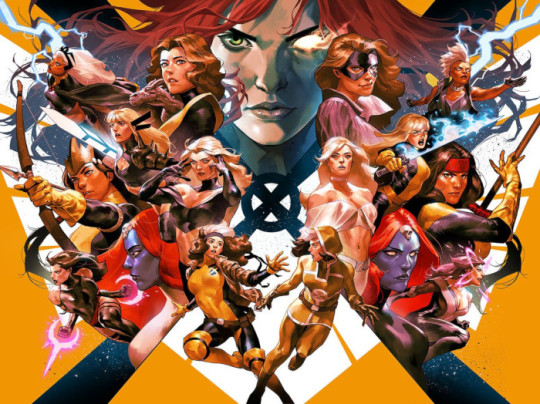
SPOILER WARNING: Below I’ll be discussing the events, themes, and possibility of what’s going on in House of X #2 and beyond. There are HEAVY SPOILERS beyond this point. If you haven’t read the issue yet and don’t want to be spoiled, please stop reading now. You’ve been warned.
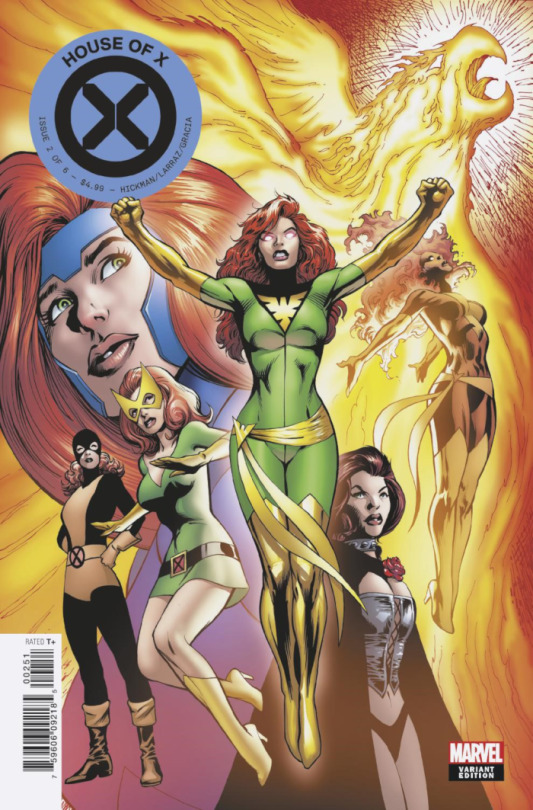
PREAMBLE | First Impressions
All I can really say is holy crap. I’ve been highly impressed so far with what House of X and Powers of X have been doing so far, but this one blows all expectations out of the water.
House of X #2 is a truly incredible story that completely reinvents the character of Moira MacTaggert, retcons decades of X-Men continuity in the process, but does so in a way that opens up endless possibilities, new stories, and more, rather than being any kind of forced insert. It’s brilliant. And it makes you wonder about all of the X-Men stories in the past, especially reading interactions with Destiny and Magneto in new contexts, and those that we’re currently reading.
Basically, Moira’s a mutant with the power of reincarnation. She keeps coming back and attempting new solutions and experiments to solve the human-mutant problem like a mutant take on Gabriel Bá and Fábio Moon’s Daytripper.
It also makes a lot of the speculation that many of us, myself included, about what’s going on in the first couple issues possibly entirely wrong. Because it changes the rules. I love it. It’s amazing and ballsy for a series as potentially dissected and analysed as this to just outright break the standard framework entirely.
Also, in regards to Pepe Larraz’s art this issue, it shifts depending on the life that’s being discussed. While Moira and the people around her are mostly the same, the panels shift and take on different shapes and angles per period. It’s a very nice and easy way to show visually that we’re seeing a different life being lived with minimal confusion or reliance on the text.
Marte Gracia continues to deliver exquisite colour art. Like Larraz’s layouts, the colours shift and change, in some ways subtle, in other ways explosively, across the different lives. It’s also impressive whenever a colourist can make an apocalyptic landscape feel dark without it looking like mud.
And Clayton Cowles and Tom Muller remain the cherries on top with letters and design respectively.
ONE | Time After Time
Throwing that spanner in the works of every theory, assumption, and possibility of the first two issues is Moira’s reincarnation abilities. It is a huge retcon that makes you question everything.
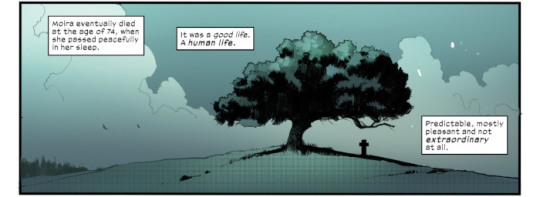
It starts out unassumingly enough with an ordinary life, lived to an ordinary span. in an ordinary way. Life One is an interesting way to lead us into this radical change to Moira’s character because it’s ordinary. It’s brilliant to present such a huge shock to the system through such a simple, unexpected life story.
And it spirals out from there as we’re taken back to Moira’s discussion with Charles in Powers of X #1, given more details and explanations of here different lives. From simple destruction chance of Life Two being cut horrifically short to the far flung length of joining with Apocalypse in Life Nine. Some lives an elements are familiar, others radically different from what we know, each apparently giving Moira a different piece of the puzzle in order to figure out the solution to the extreme division between humans and mutants.
I find it somewhat funny, given the text piece in Powers of X that sending mutants into space isn’t one of the primary proposed ideas through any of these lives, but maybe that’s something we’ll see when and if she finally gets things right.
I also find it interesting that one of the lives that gets the most attention is when she picks man over mutant in Life Three. It’s one of the ones that goes horrifically wrong as she decides that mutants are a disease needed to be stamped out, coming up with a cure to eradicate them. It establishes Destiny as an arbiter of justice to temper if Moira decides a similarly destructive path.
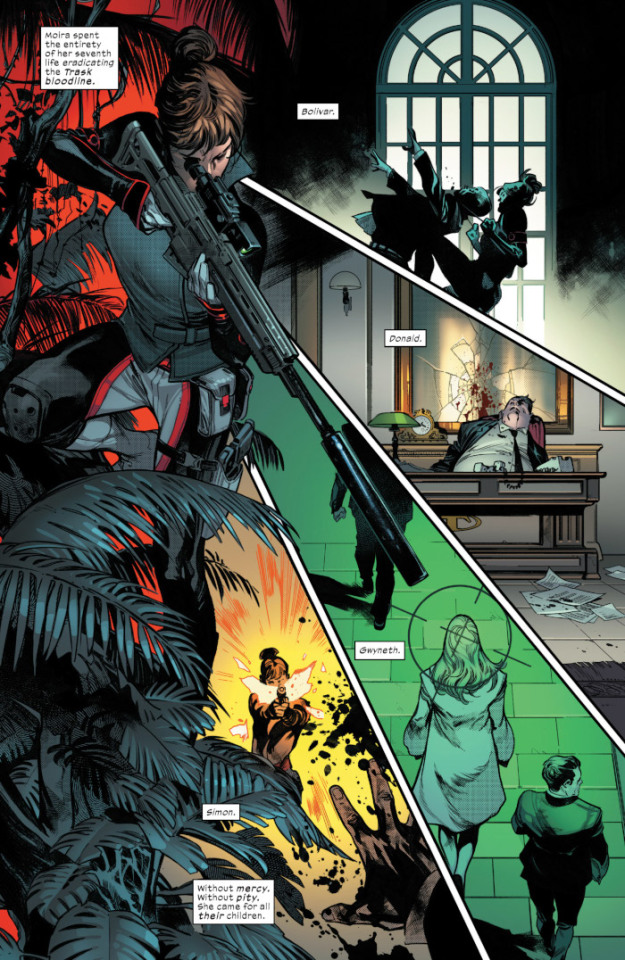
The various differently lives briefly shown throughout the story are also fascinating. They beg to be expanded upon through a series of specials and mini-series mining the different possibilities of these alternate existences. They feel rich and well-realized with interesting events informing on Moira’s decisions through her lifespans.
Although they can be left as throwaway ideas within the larger framework of the House of X/Powers of X event, there’s fertile ground here to expand upon in time. Moira VII Assassin could be an interesting, dark, and cynical thriller, especially as compromises to morals and ethics become hollow as the machines manifest anyway. A new Age of Apocalypse in Life Nine practically screams to be explored. It’s fascinating how all of these lives combine, recombine, and mix different common elements and themes across X-Men history and spin out something new.
It also makes you wonder about those time periods in Powers of X #1. We think that X0 through X3 are the same timeline. This issue opens up the possibility that that may not be the case. The futures might be from one of Moira’s previous lives. We don’t know yet what exactly we’re seeing and that uncertainty adds a fair amount of excitement to see what’s coming next.

What we’re seeing in House of X and Powers of X could be Life Eleven, since there are already some radical departures in how Krakoa seems to work, and all of the people who are now alive that were dead. I’ve gone through thoughts as to how it could be messing with time, but Moira’s reincarnations seems to eliminate that theory entirely. It’s also easy in story terms since it would essentially give a blank slate to establish the rules of this new reality, but I think that’s too simple.
I think, however, that we’re currently witnessing Life Ten. For one, we’re referring to Moira often in these series as Moira X, which would seem to infer more that this is her tenth life, rather than necessarily X as in Xavier or X-Men or even as a placeholder X for her multiple possible surnames (Kinross, Cowan, MacTaggert, Xavier). It also potentially rewrites the meaning of the title Powers of X as being more personal, not just referring to the time periods, but these being the “Powers of [Moira] Ten”. It takes all of the huge, reality and time-spanning ideas and humanizes it, making it a personal tale of one woman’s struggles.
I think Life Eleven is triggered at the end of House of X/Powers of X and is the seed for the “Dawn of X” titles spinning out of this story.
TWO | Entanglements
The wider implications of Moira’s powers are felt in how long you’ve been reading X-Men comics and whether or not you want to do a deep dive into the past. It could be fun, it could be maddening, and ultimately the story in House of X and Powers of X doesn’t necessitate it. You can read this still without having ever read a single X-Men comic and enjoy it.
But over-complicating things is a pastime of longtime X-Men readers. These books were written for a long period of time by Chris Claremont, after all.

One of the major things that this shows in various permutations throughout the story is redefining Moira as one of the primary movers throughout history. She serves now as a catalyst for events and direct causes for divergence points creating alternate timelines. In some ways subtle, in others profound.
I’ve stated and speculated previously that Xavier seems different through the first issues of both series, in terms of the X1 Xavier potentially exhibiting telekinetic powers he never had and his kind of creepy character affectations (that could have been continuing on with X’s behaviour from Astonishing X-Men) and the seeming oddity of not knowing who Moira was in X0, which I thought could have been put down to time travel shenanigans, but that seems moot with House of X #2. It’s probably just a new reality that we’re dealing with.
It raises questions as to whether or not Xavier is really a puppet master as previously believed, or just another cog in the Moira Machine, figuring out that possibly the only way to answer the Man-Mutant conundrum is to get Xavier, Magneto, and Apocalypse (and possibly the machines) all working together.
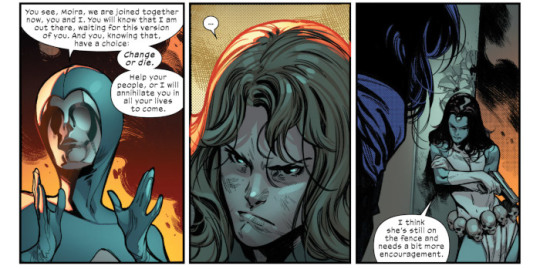
And then there’s Moira’s run during the ‘80s. The Muir Island X-Men. Magneto’s rehabilitation. Working with the New Mutants. Aiding Xavier throughout. It takes on an entirely different element knowing that she was knowledgeable of various events beforehand. It takes working with Freedom Force in an entirely different light. There’s undoubtedly a lot you could dive deeper into in order to figure out how things stack up in this new light.
THREE | Number Six
Curiously missing from the infographic giving Moira’s timeline is Life Six. There’s a gap between Life Five and Life Seven that remains unaccounted for. Nor does it come up when she’s talking to Charles Xavier explaining to him who he is.

For a story that is built on detail and complexity, the omission has to have a reason. And because it’s missing, we can potentially get endless speculation as to why it’s missing.
Personally, I think it could be because it’s actually the baseline Marvel Universe that we knew. Life Ten would appear to be that, being consistent with what we know, but there’s doubt. We’ve been told through Moira’s conversation with Destiny that she has a limited amount of reincarnations, ten, with possibly an eleventh if she got things right.
Or I could be completely wrong and it’s something else entirely.
CONCLUSION | I’ve Got a Lovely Bunch of Coconuts
It’s taken me a while to put fingers to keyboard on this one for a number of reasons, one of the primary ones being that this story just left me gobsmacked. It presents so many different possibilities and reinterpretations that you’ve practically got to tear up the script as to what you thought was going on. It makes you question whether or not anything at all that you’ve read before is in a particular frame or even relevant to a particular frame.
It’s incredible.
Hickman, Larraz, Gracia, Cowles, and Muller have managed to take an already impressive new approach to the X-Men and elevated it further beyond imagining. It’s very exciting. House of X #2 represents an even greater sea change than we were led to believe.

d. emerson eddy is fairly certain he doesn’t reincarnate into the same life if you kill him, so please don’t try.
9 notes
·
View notes